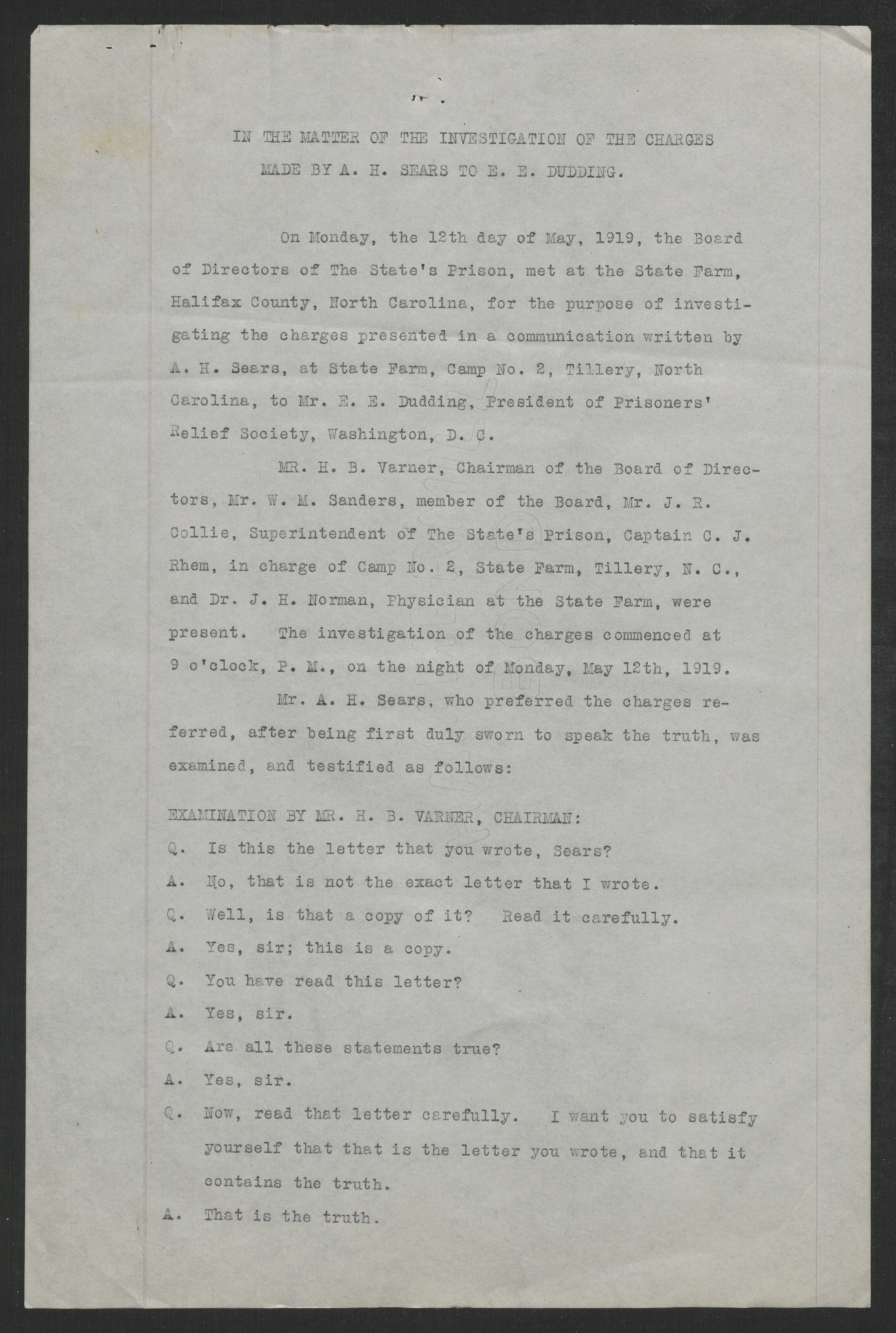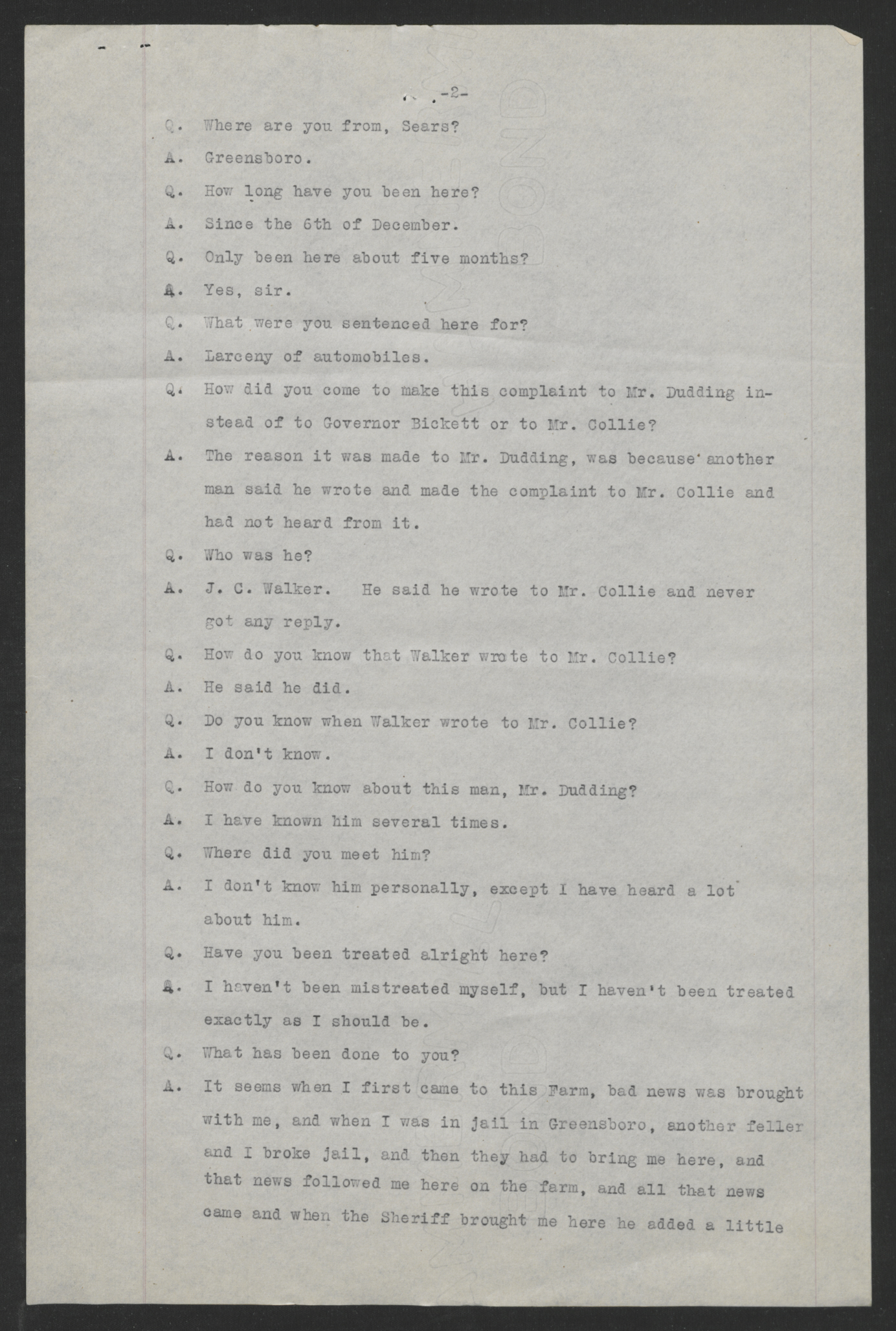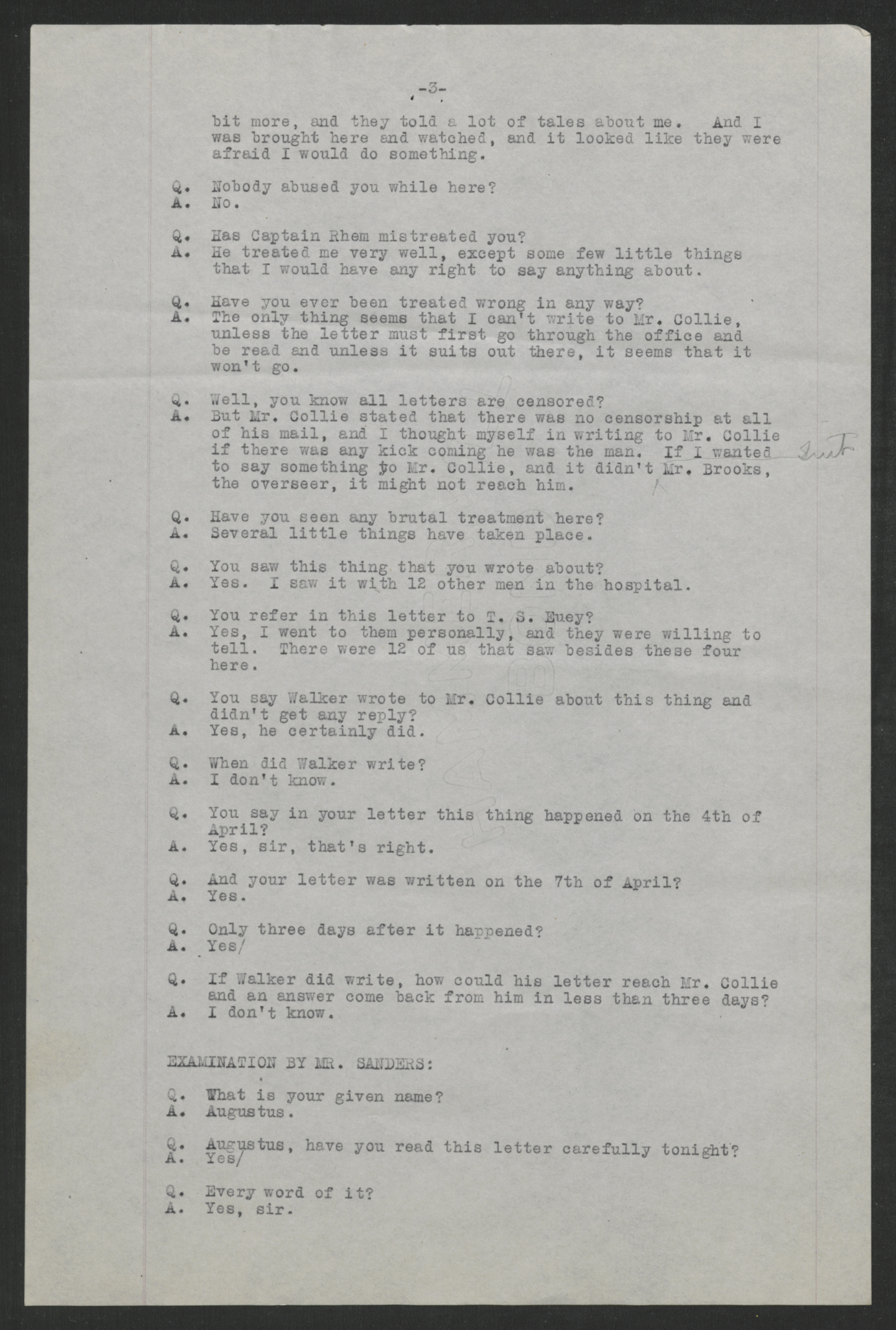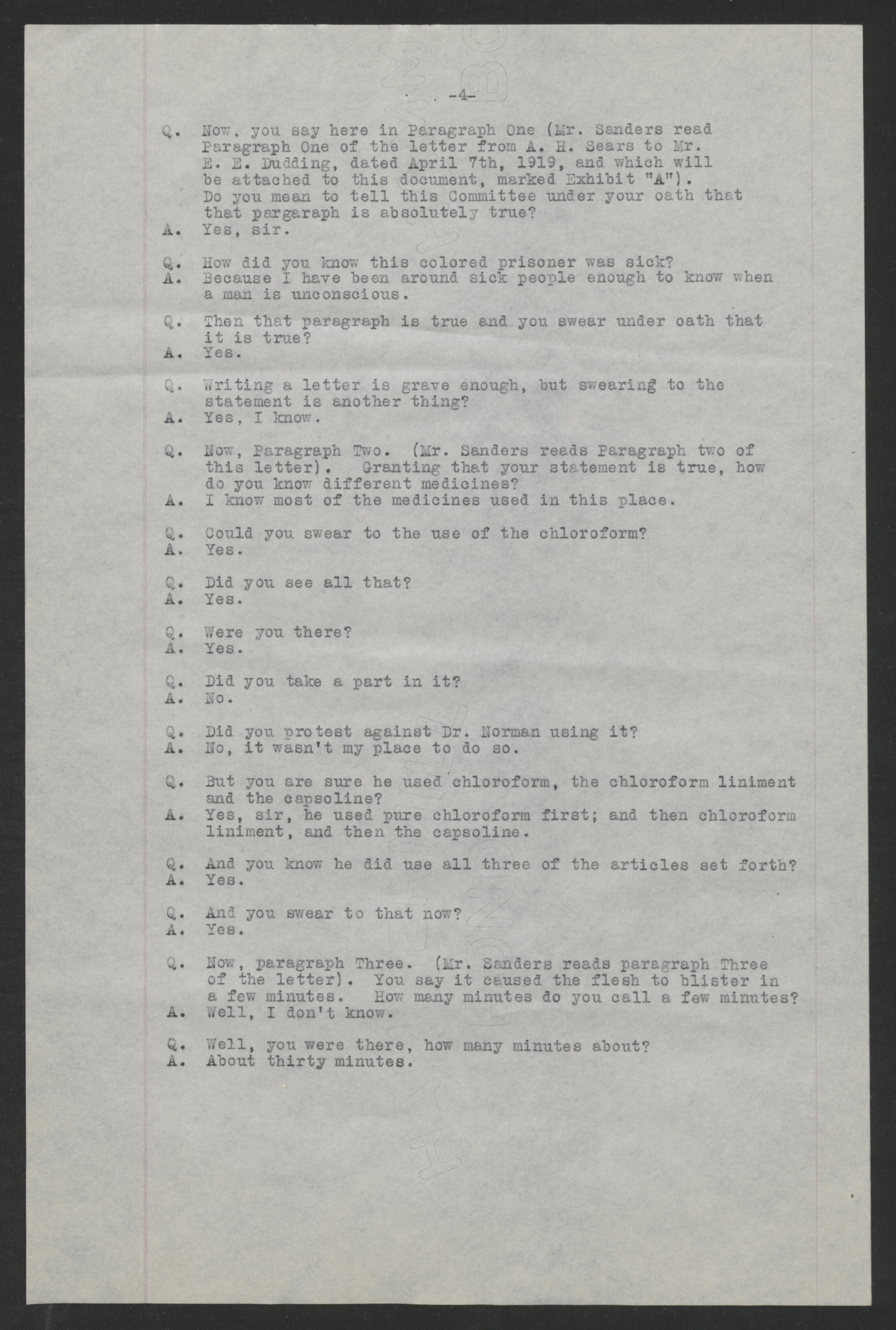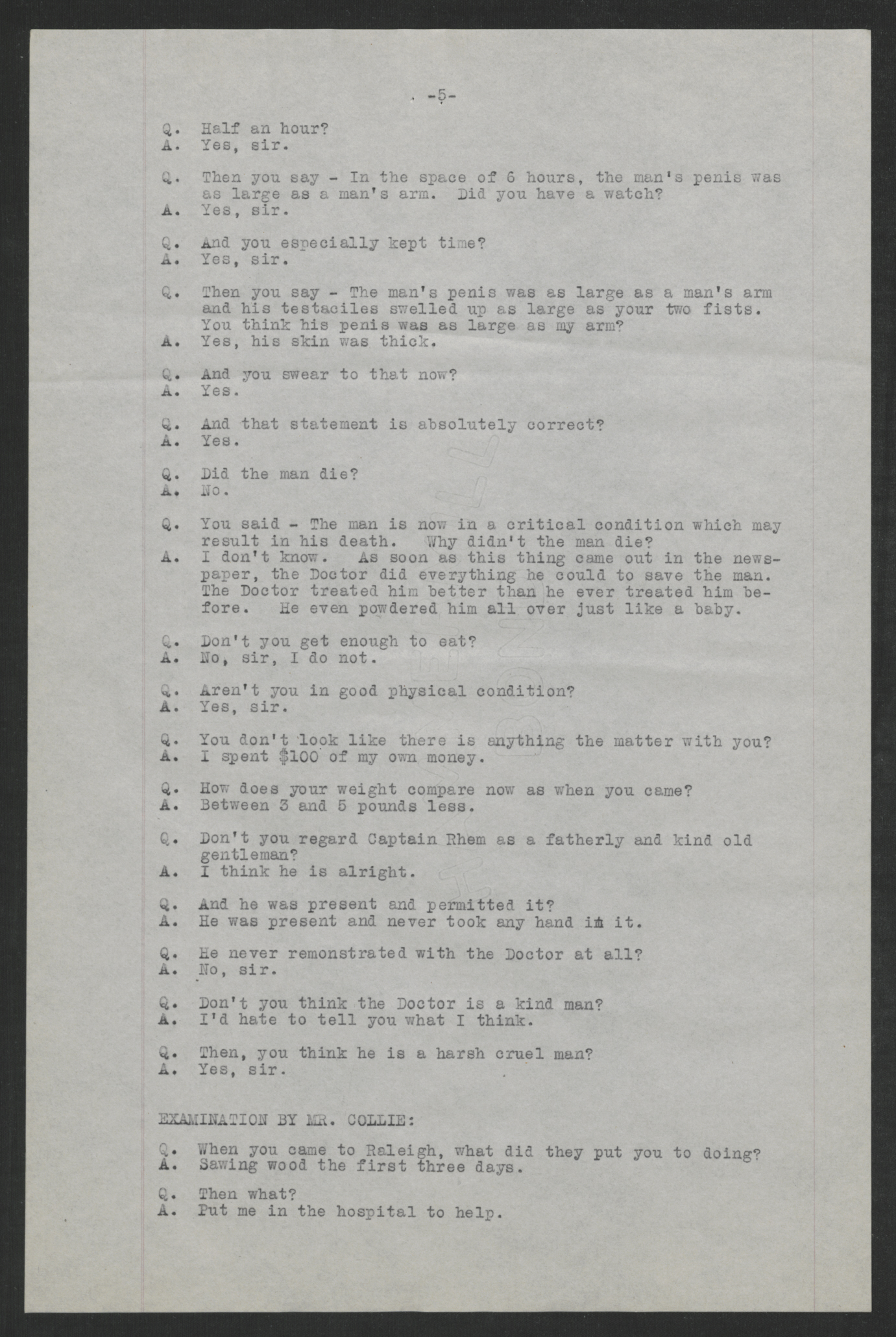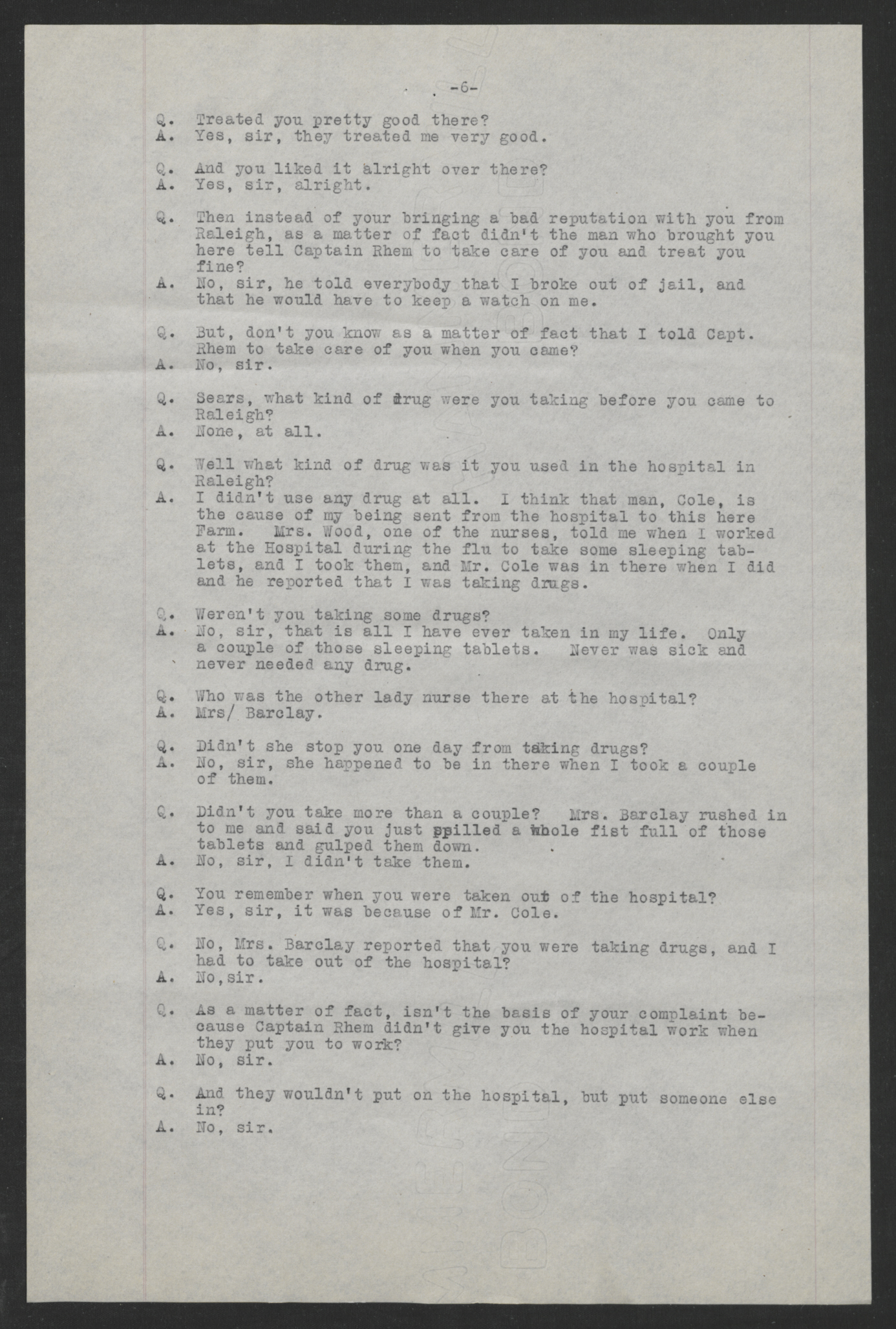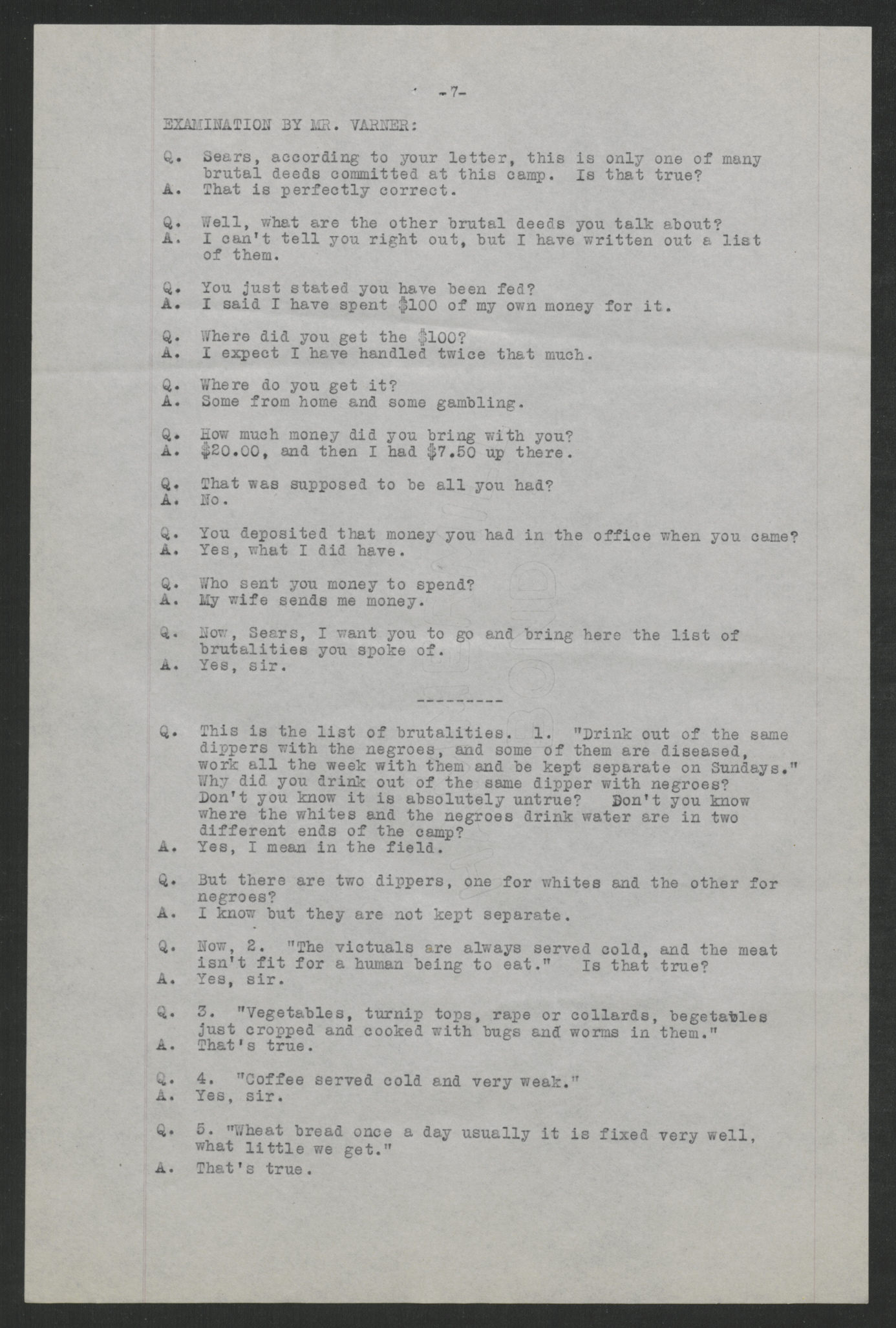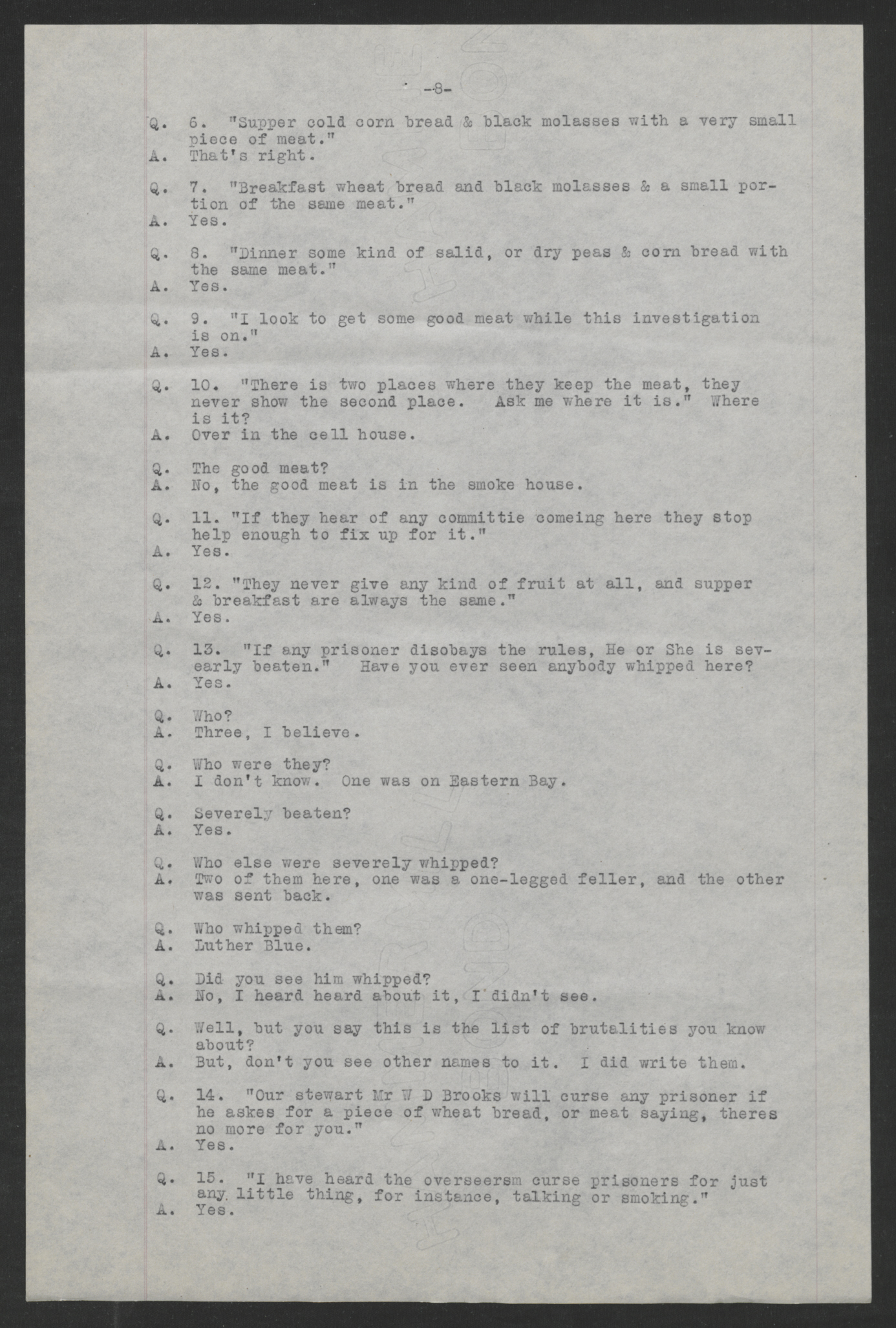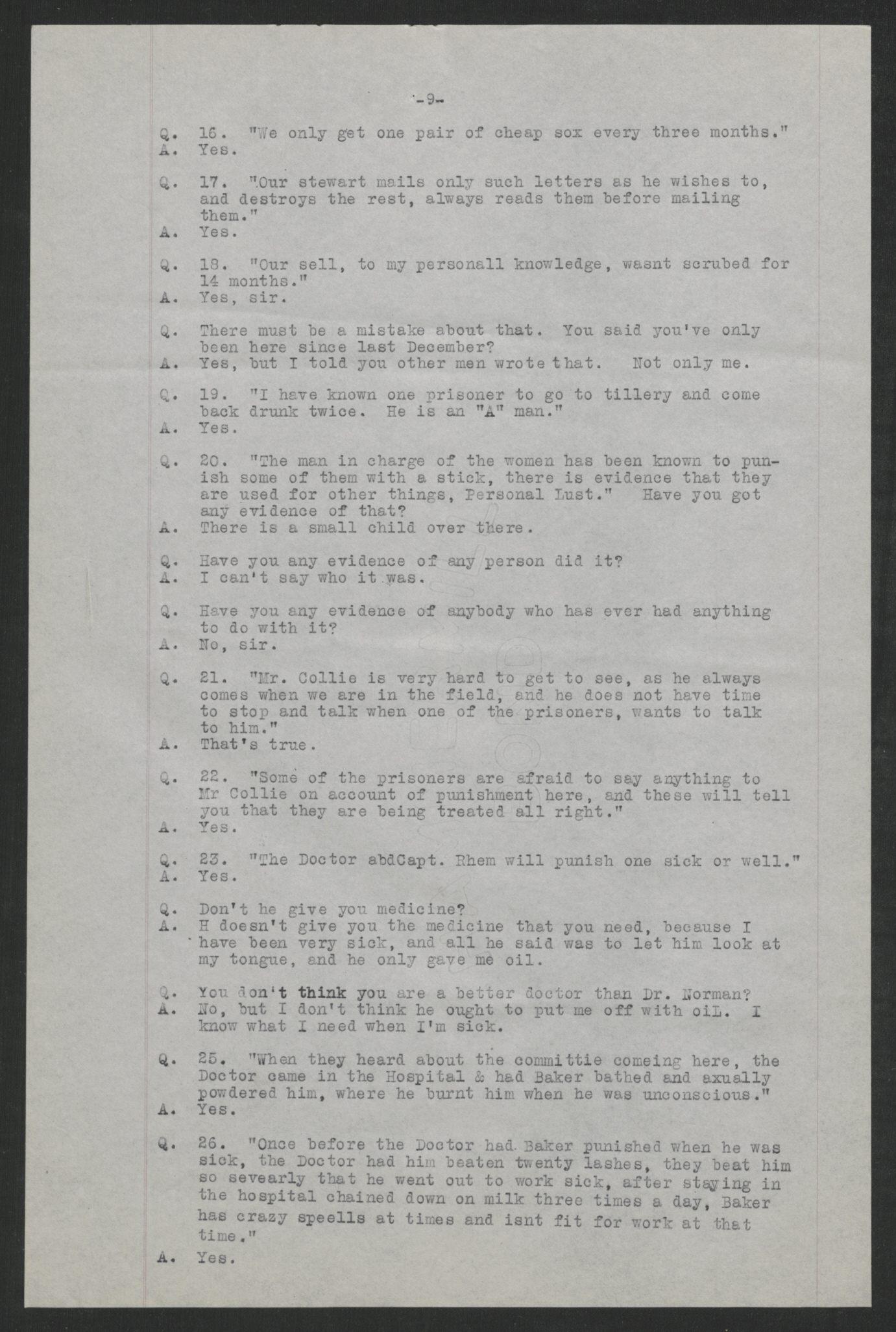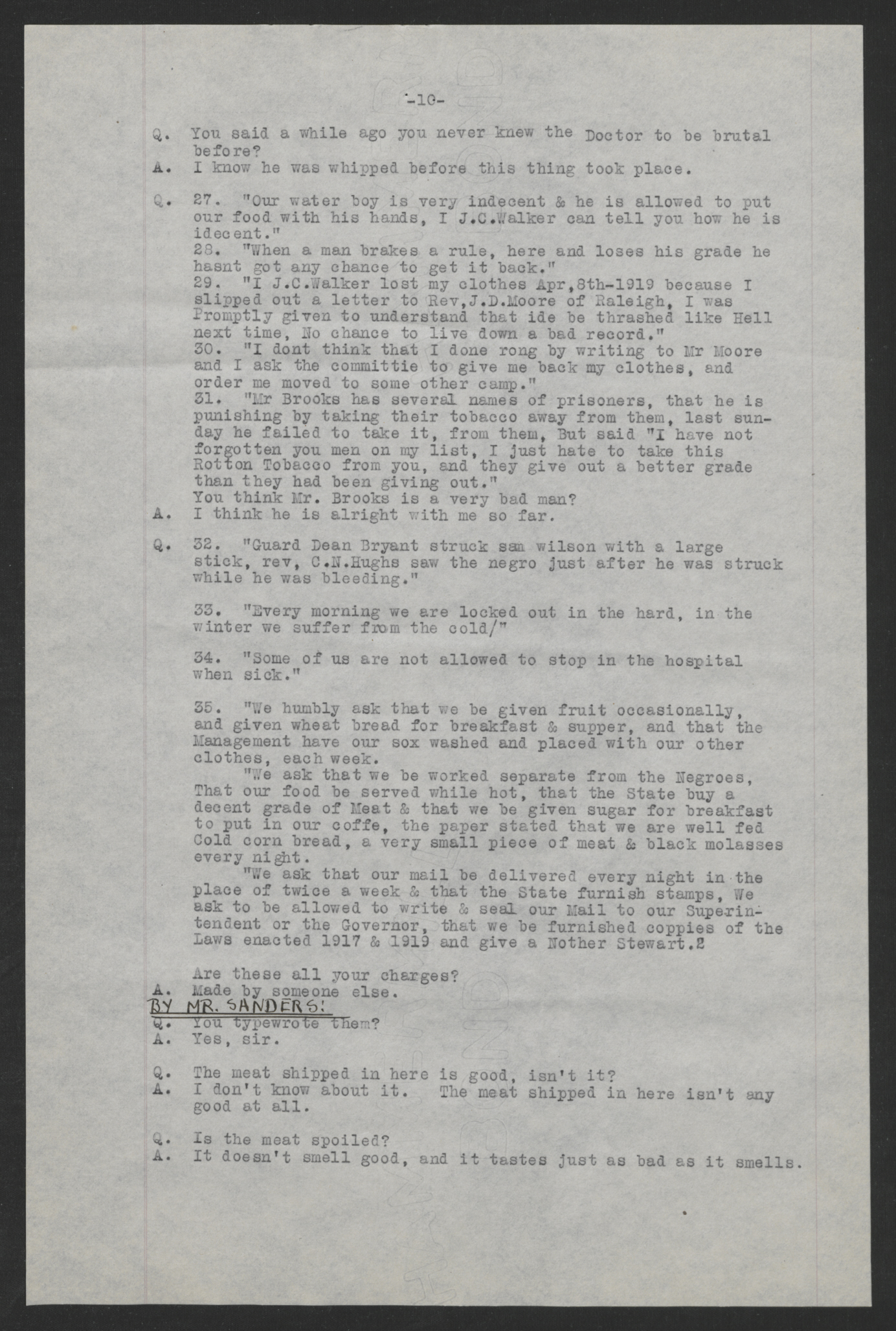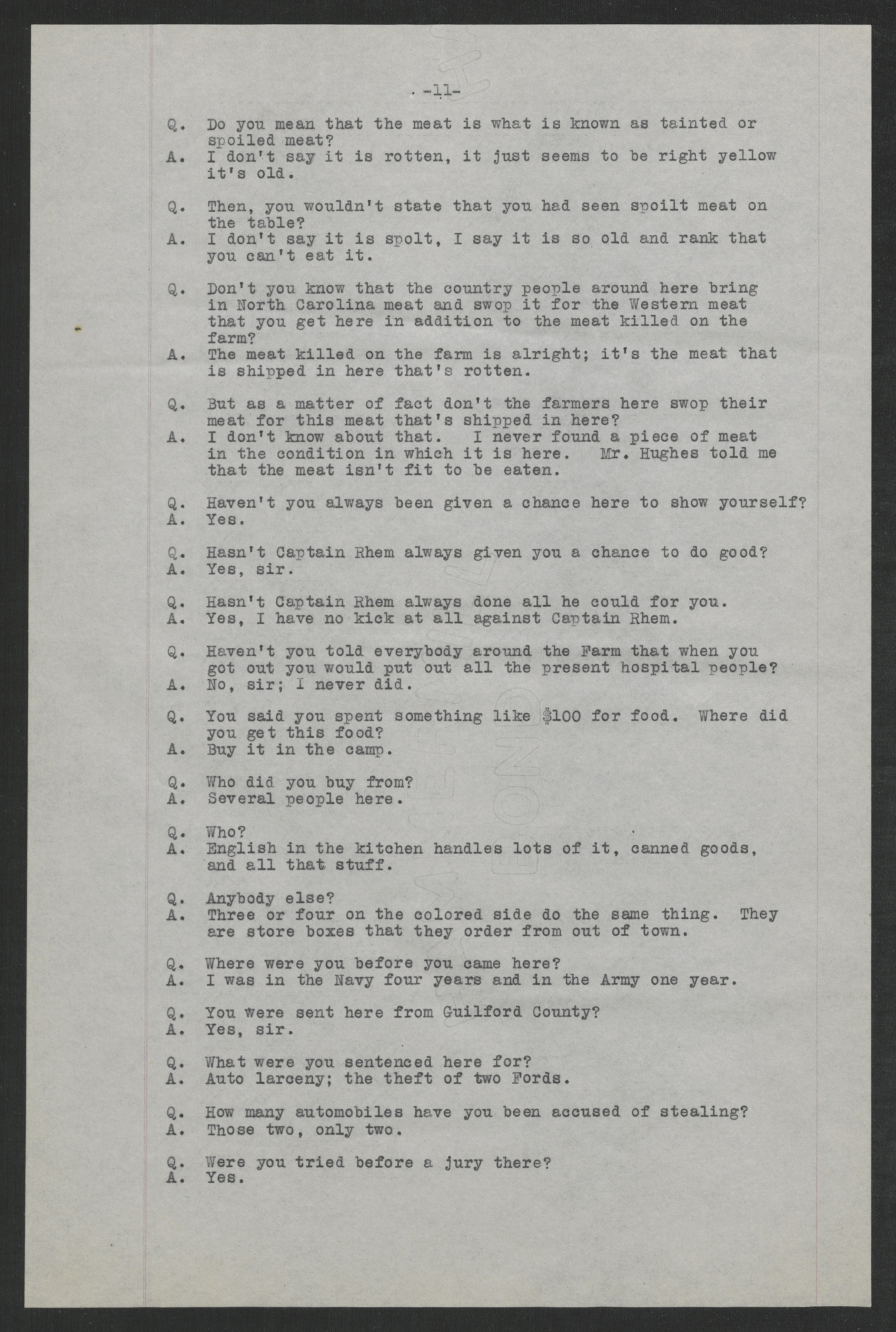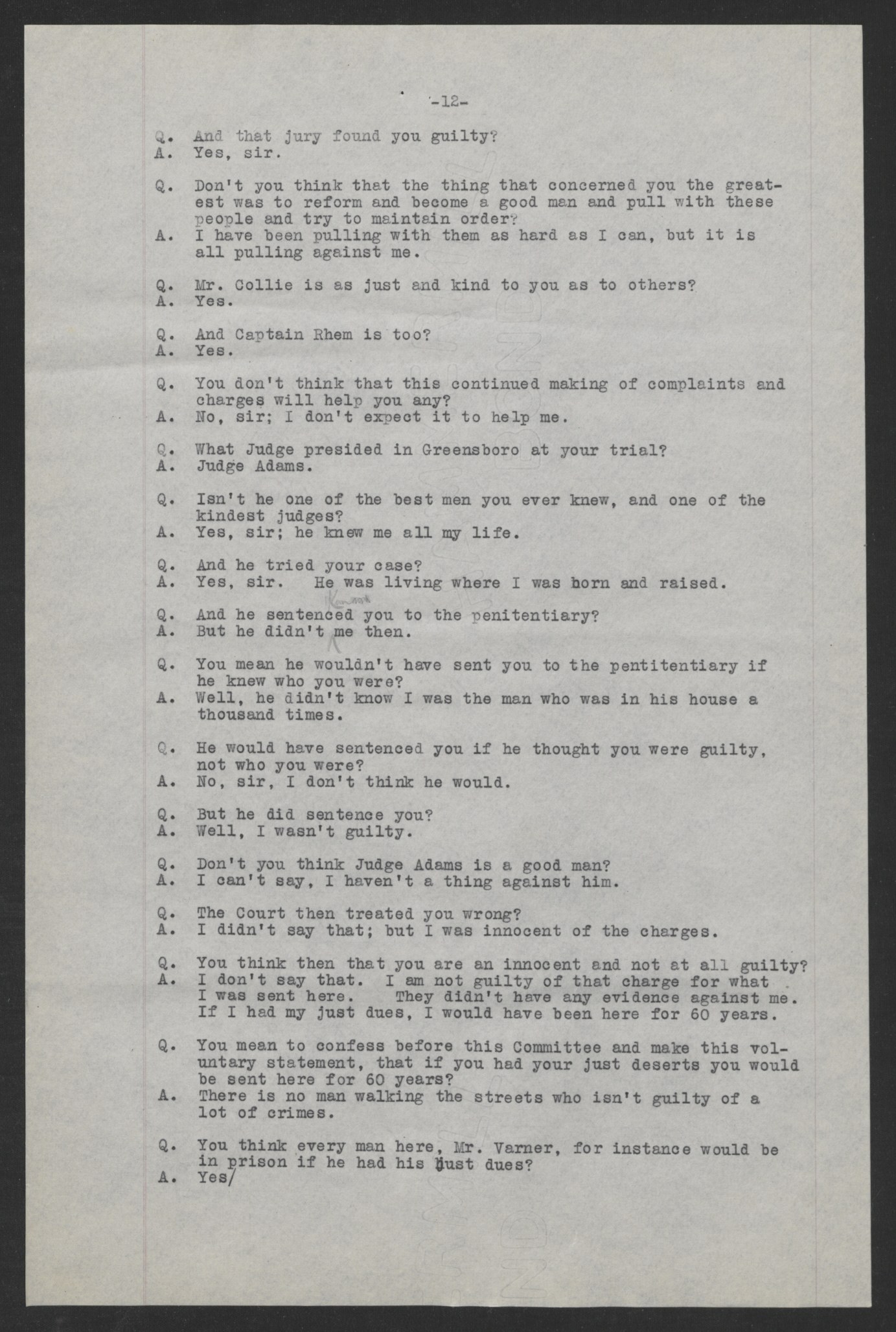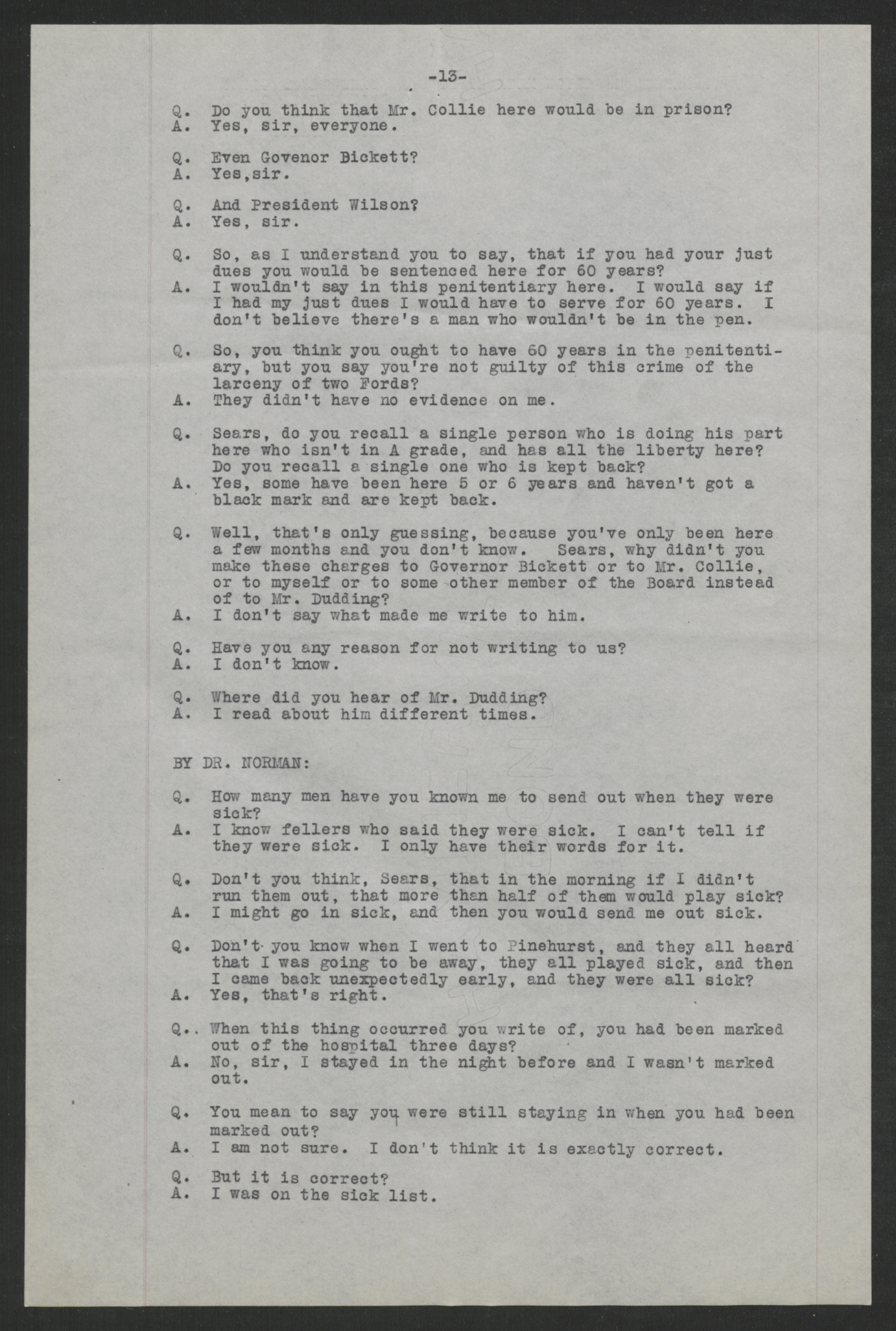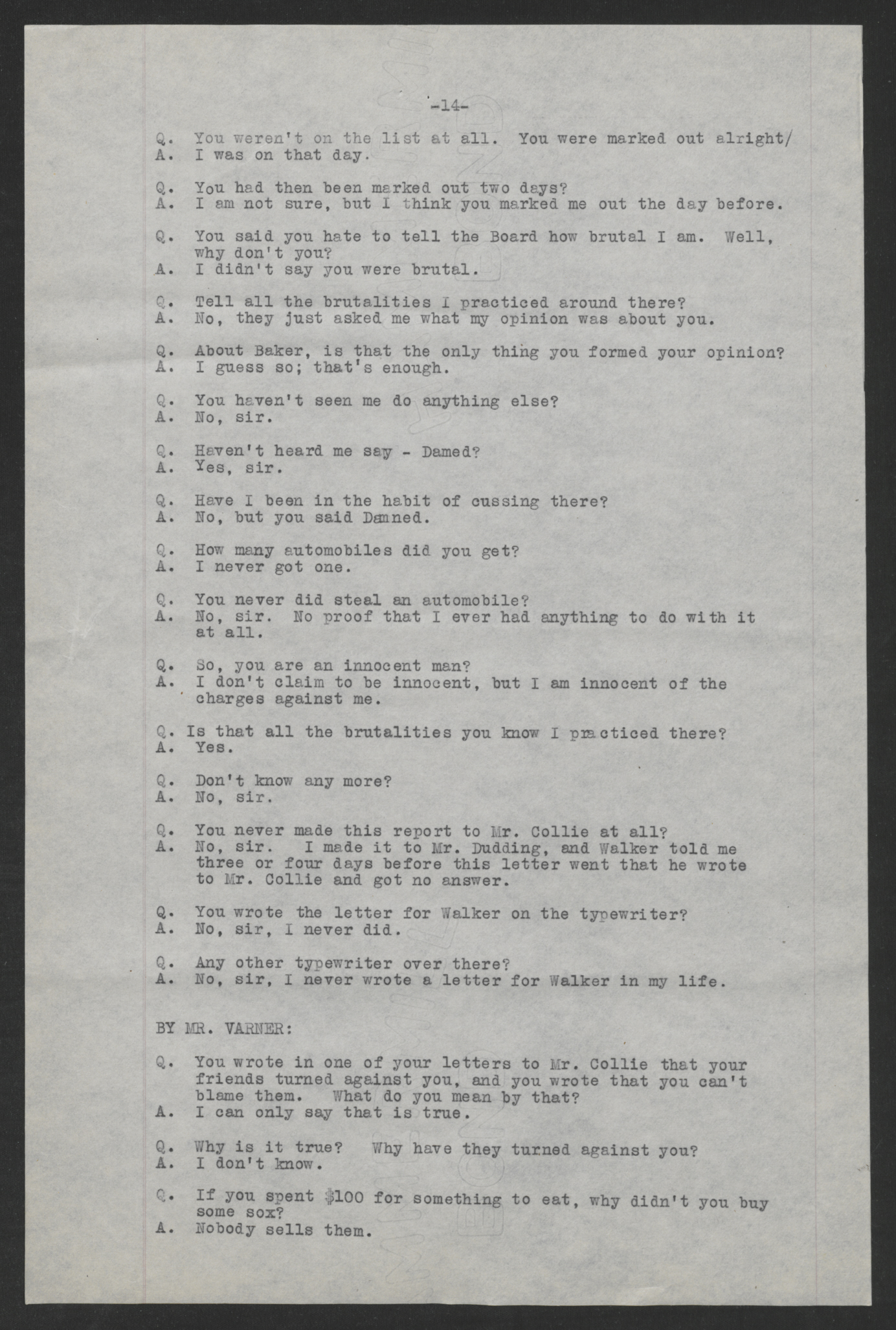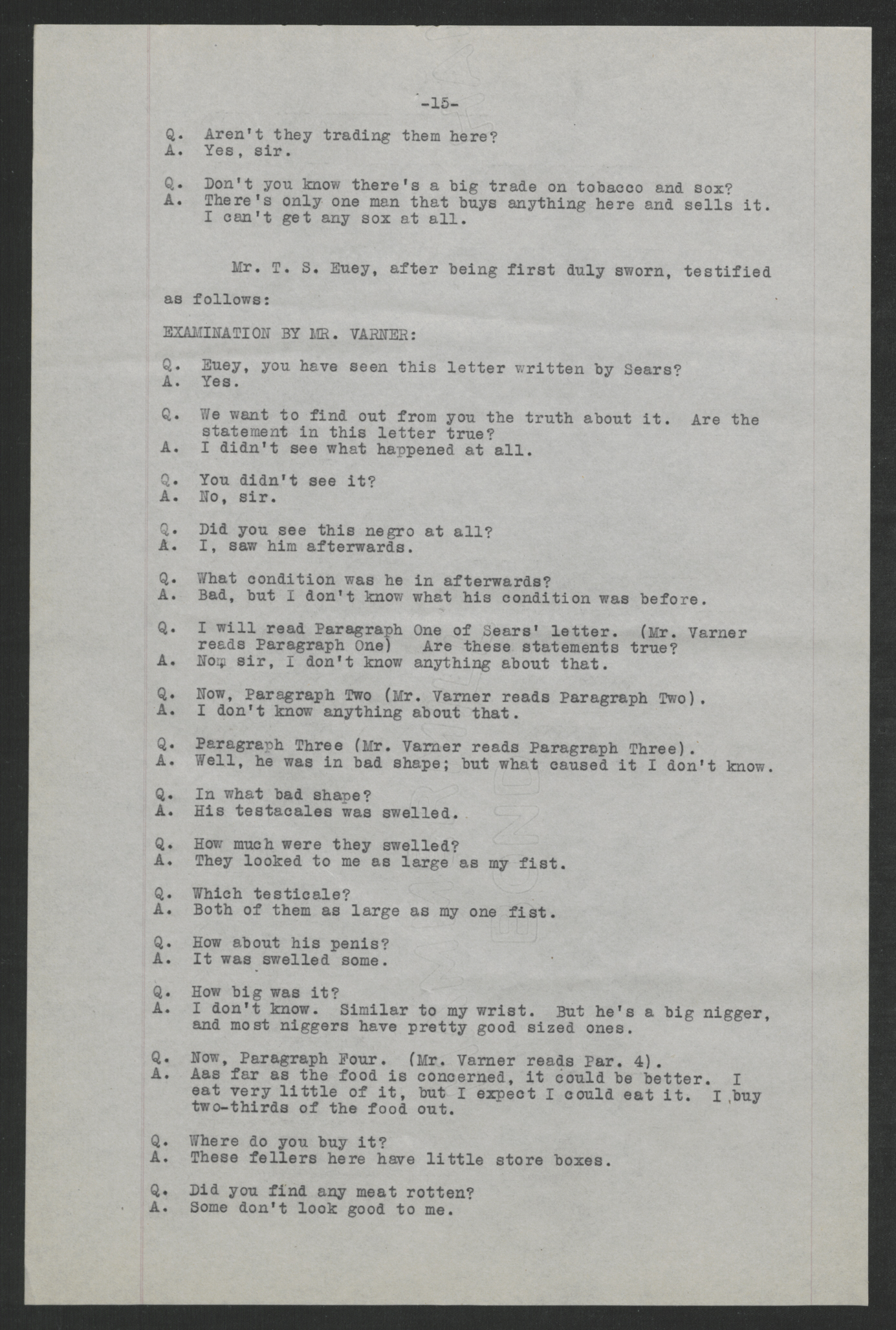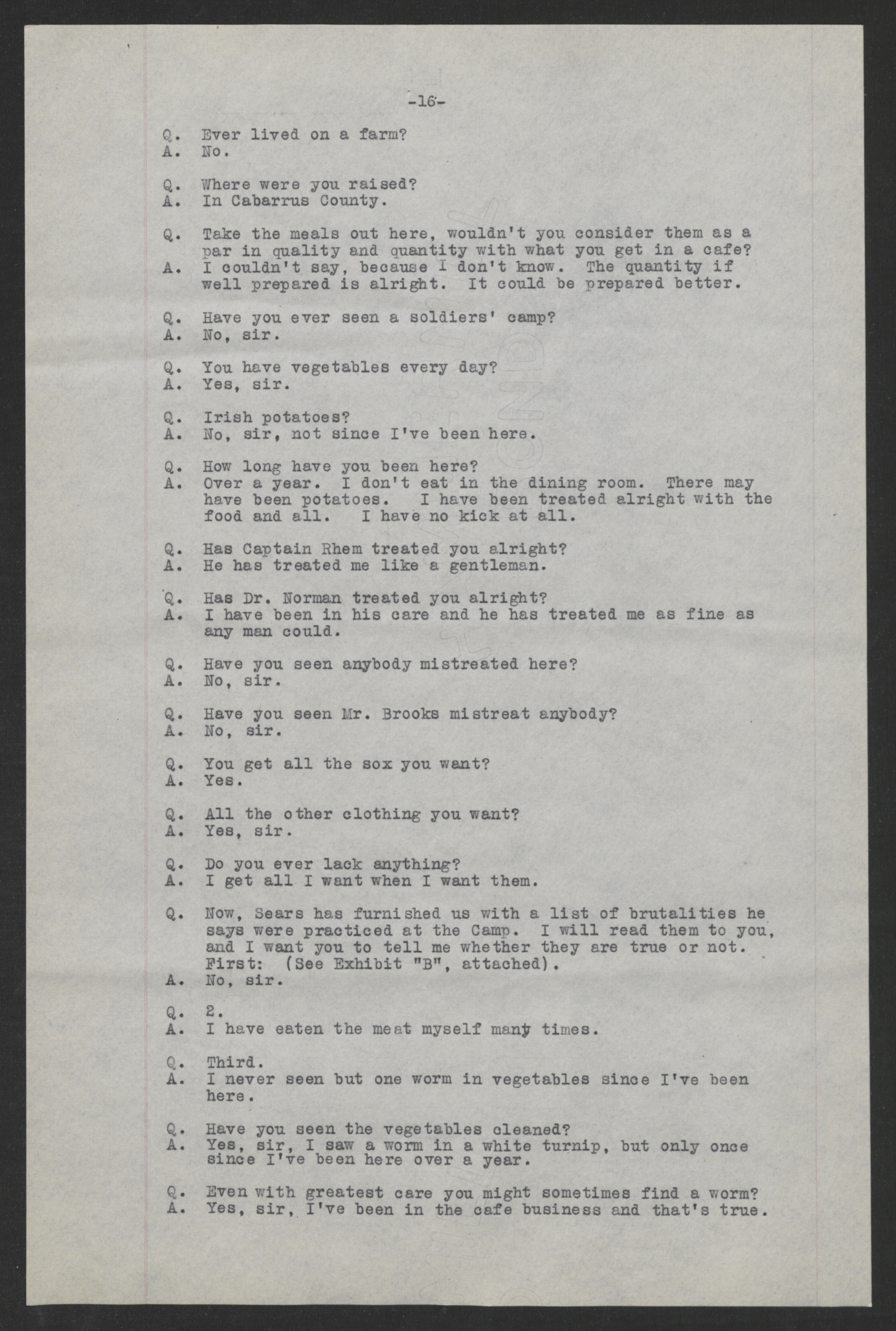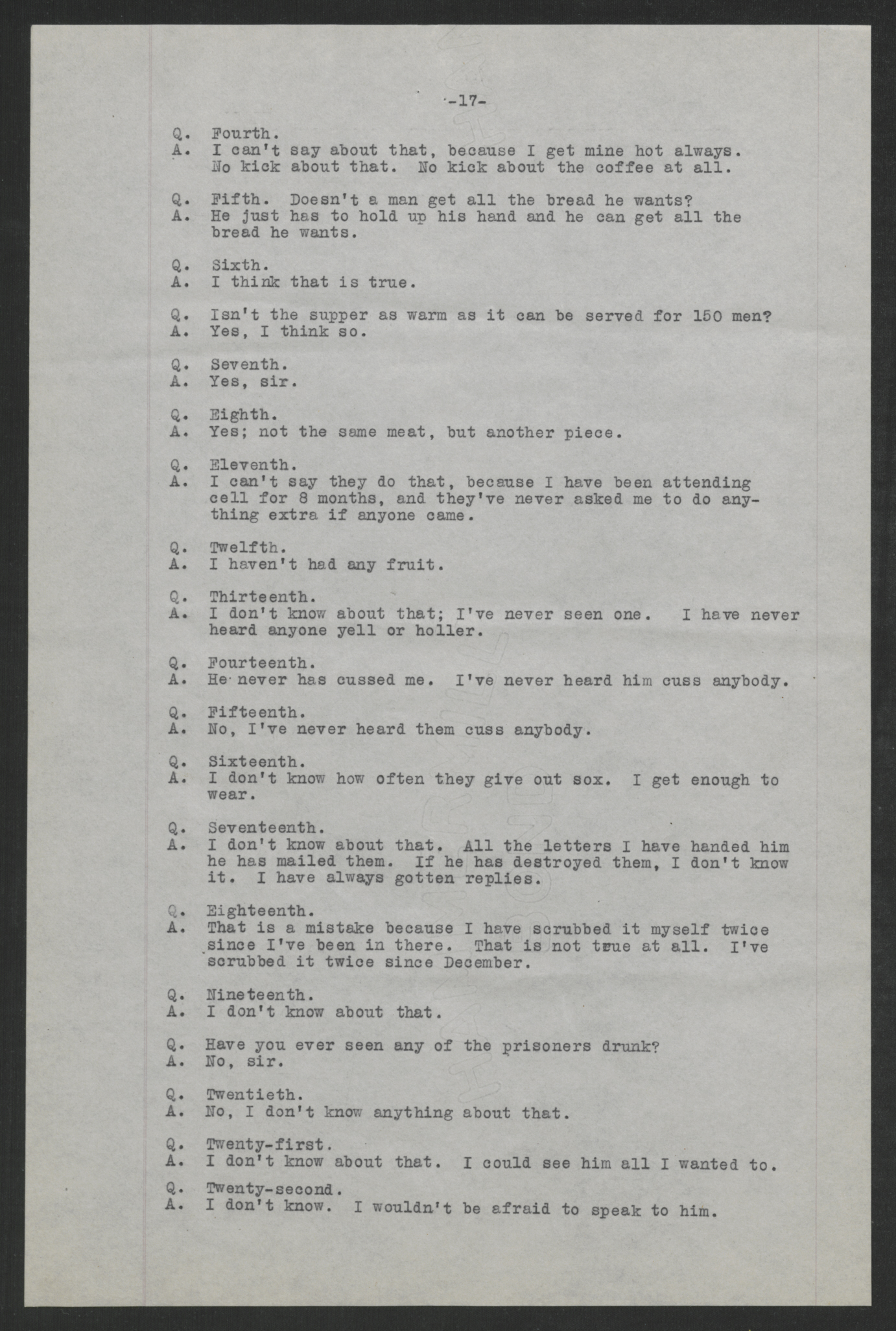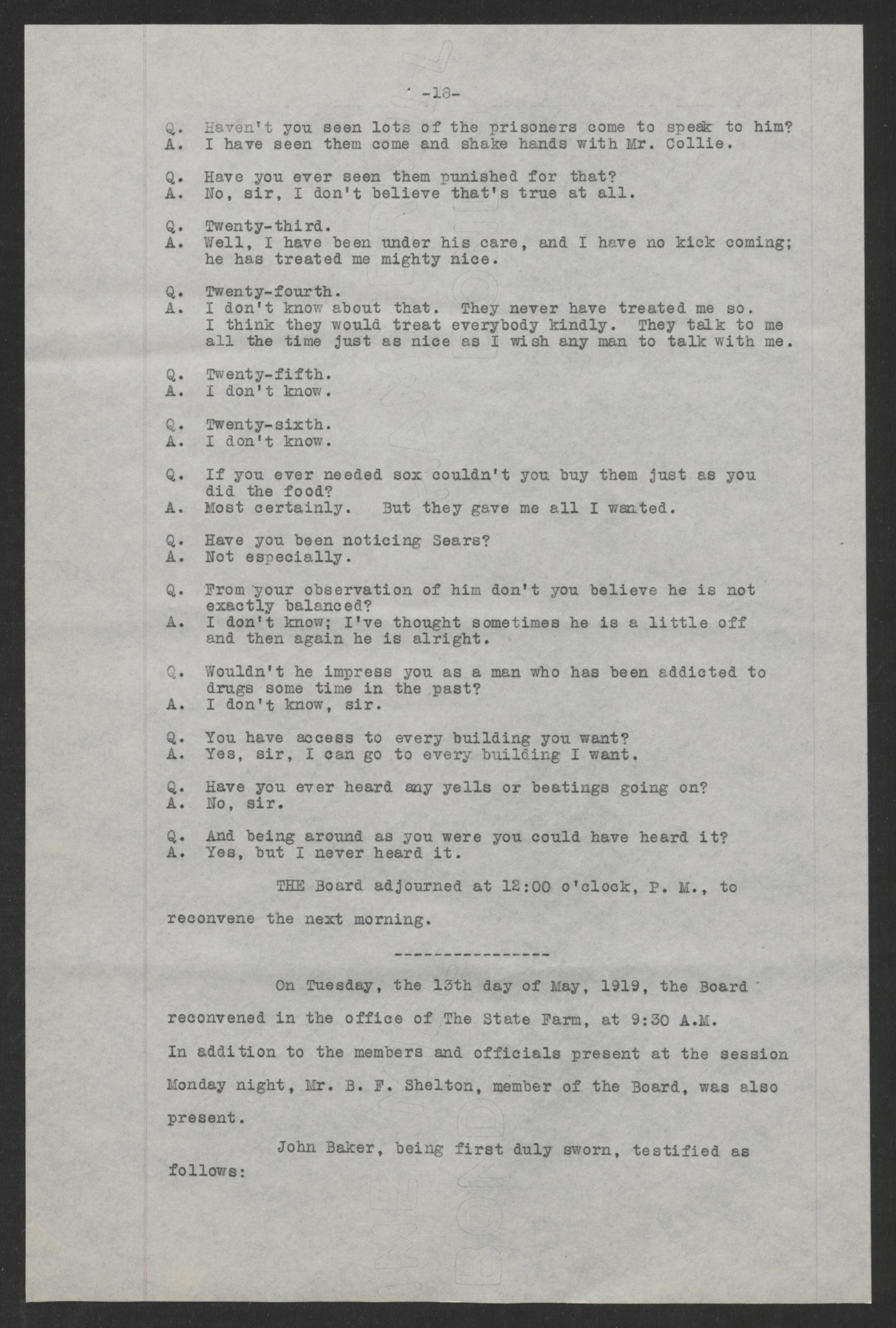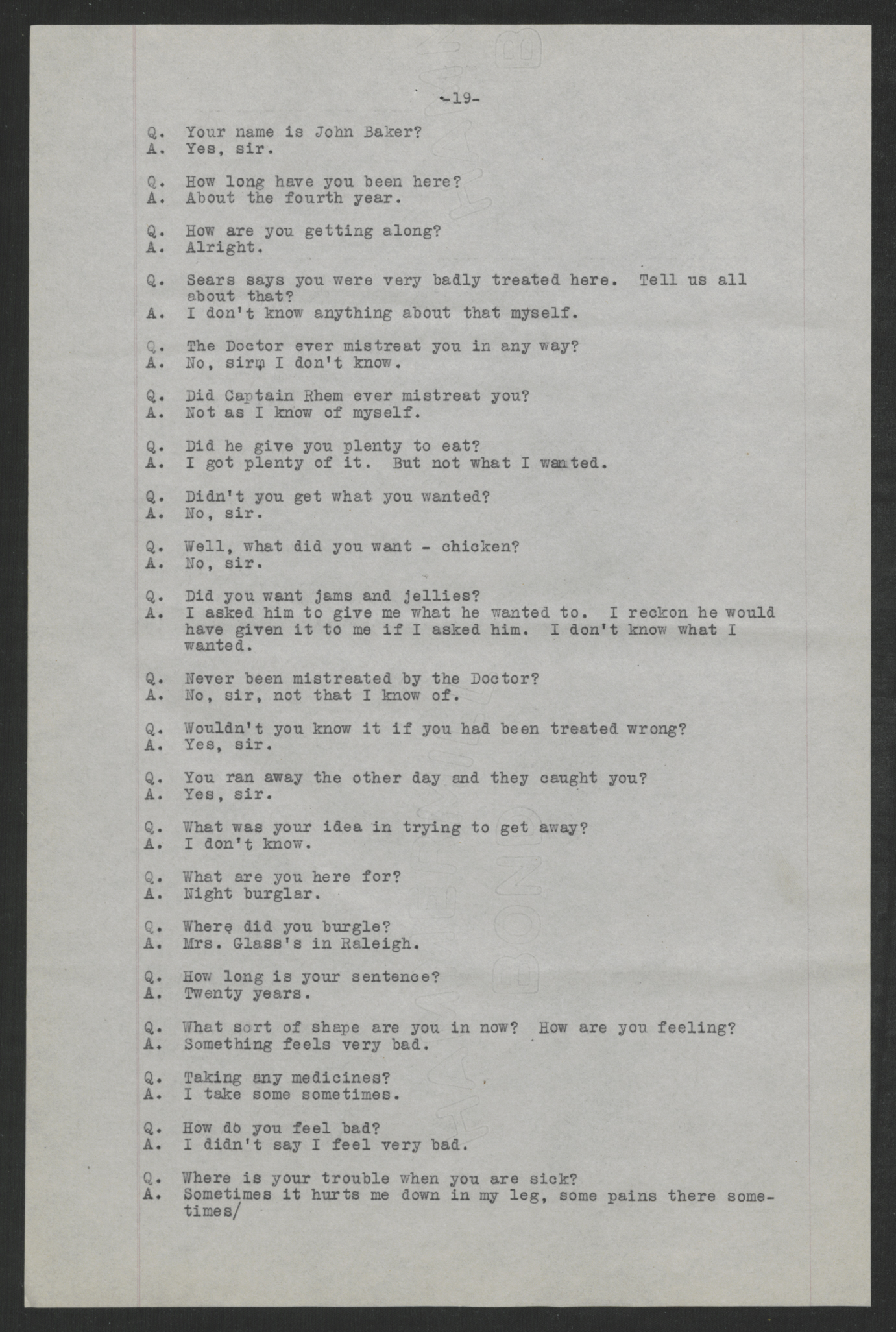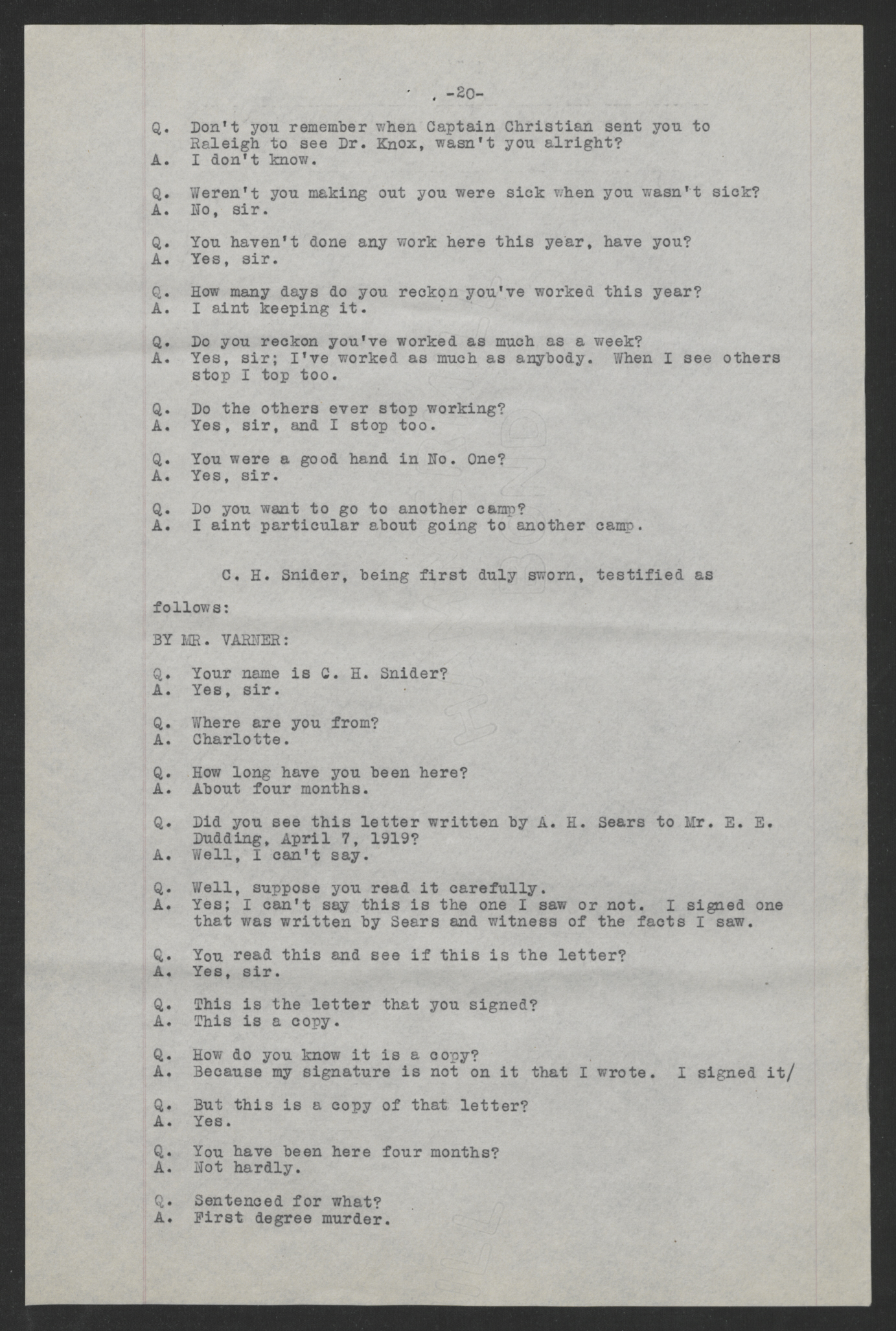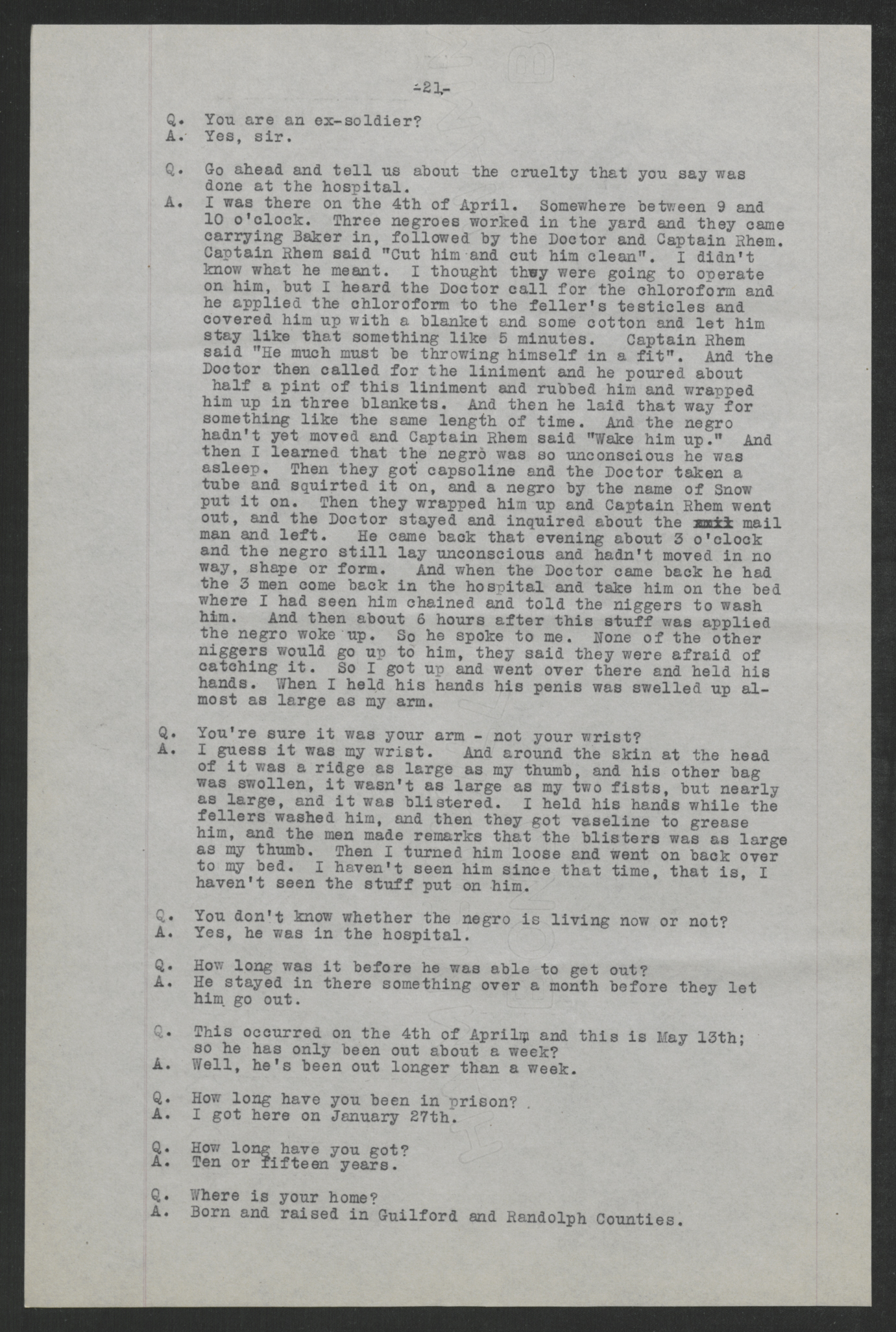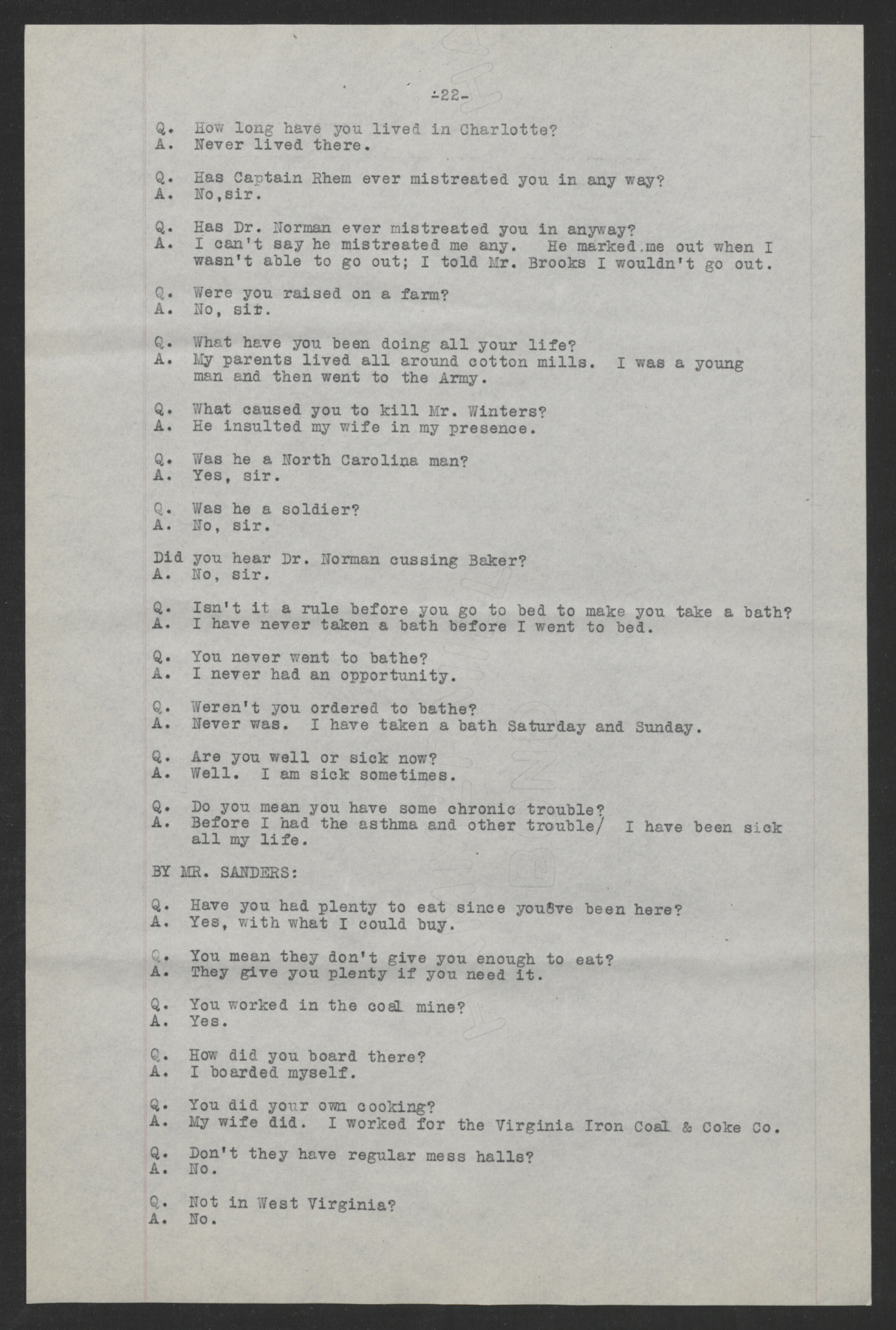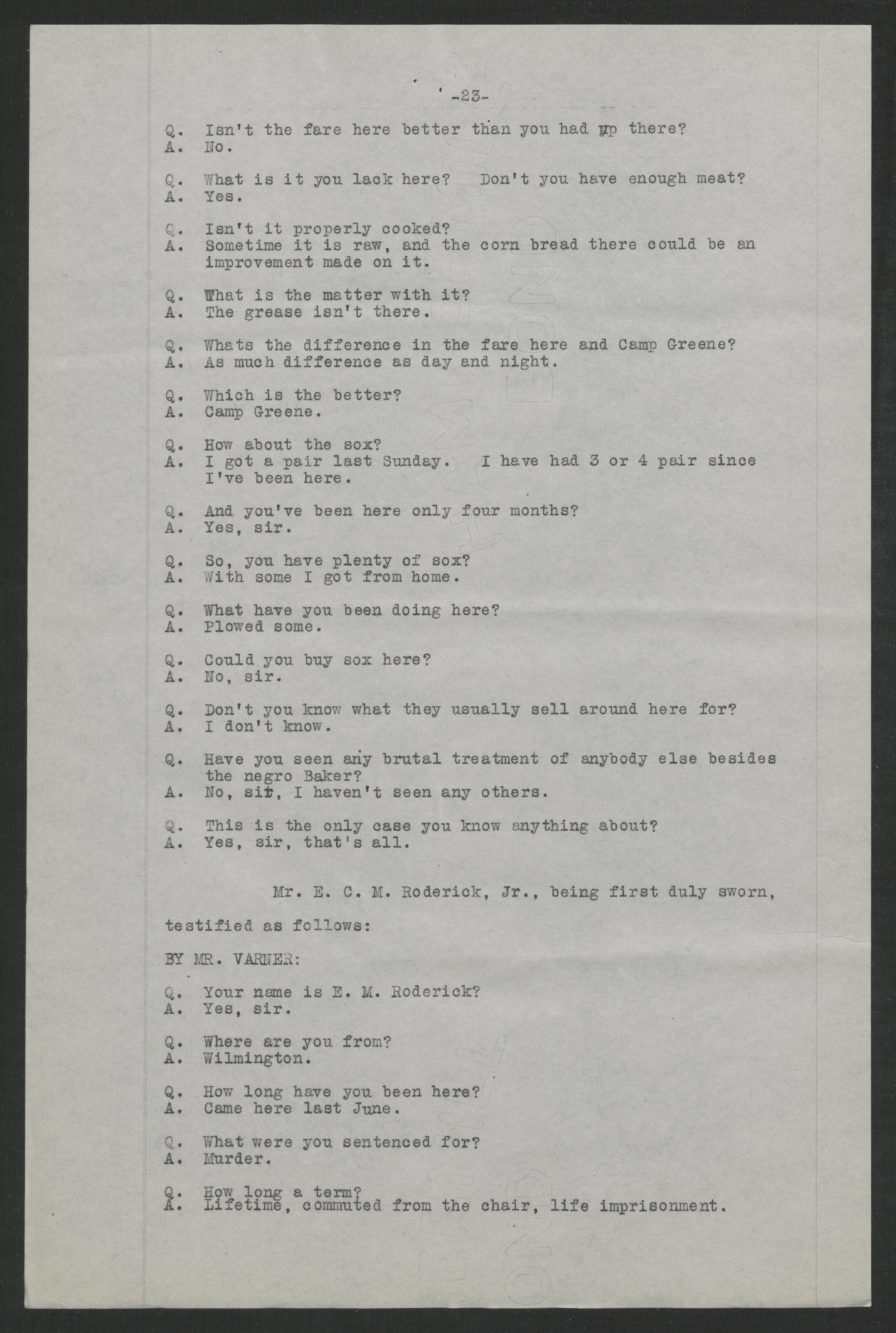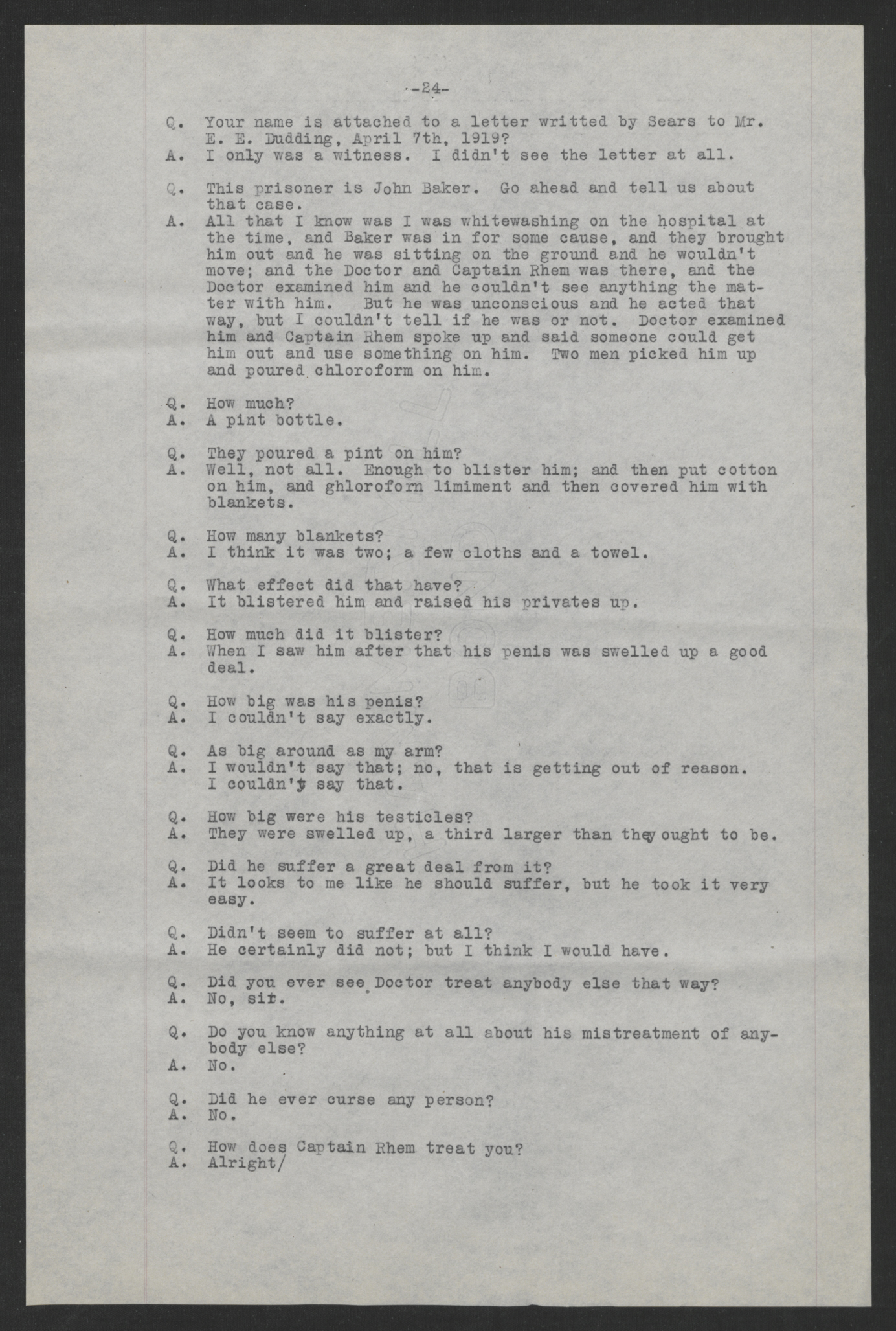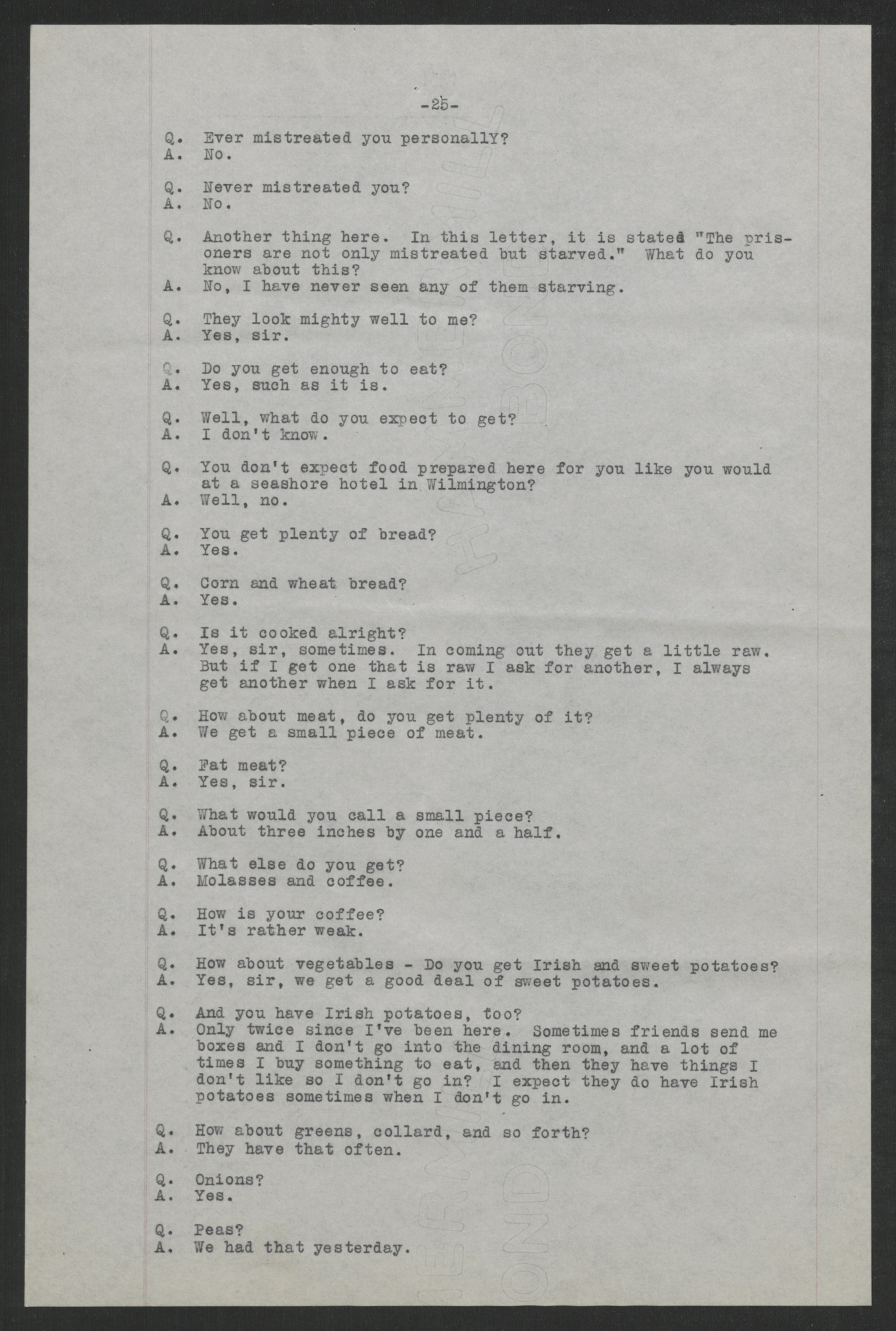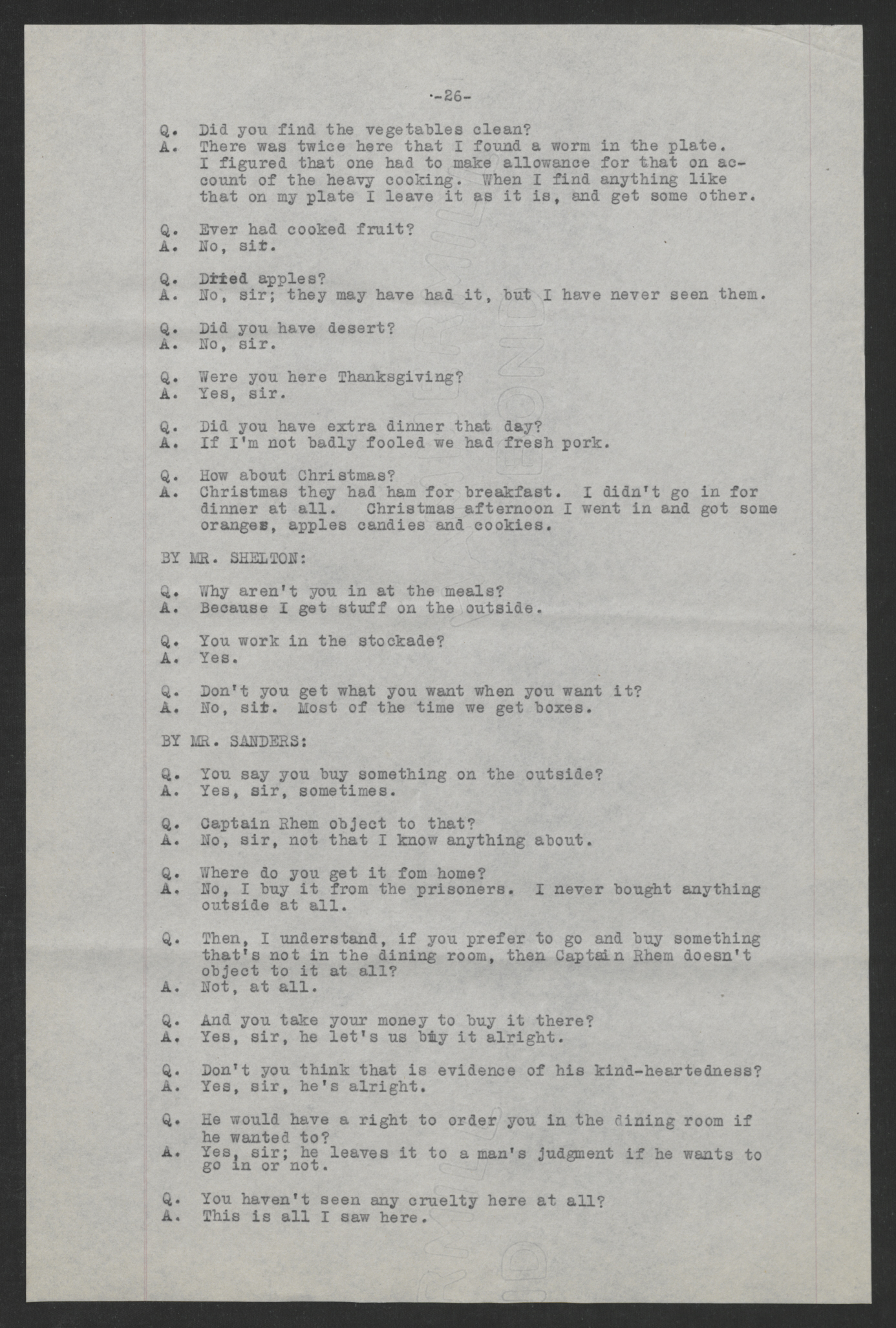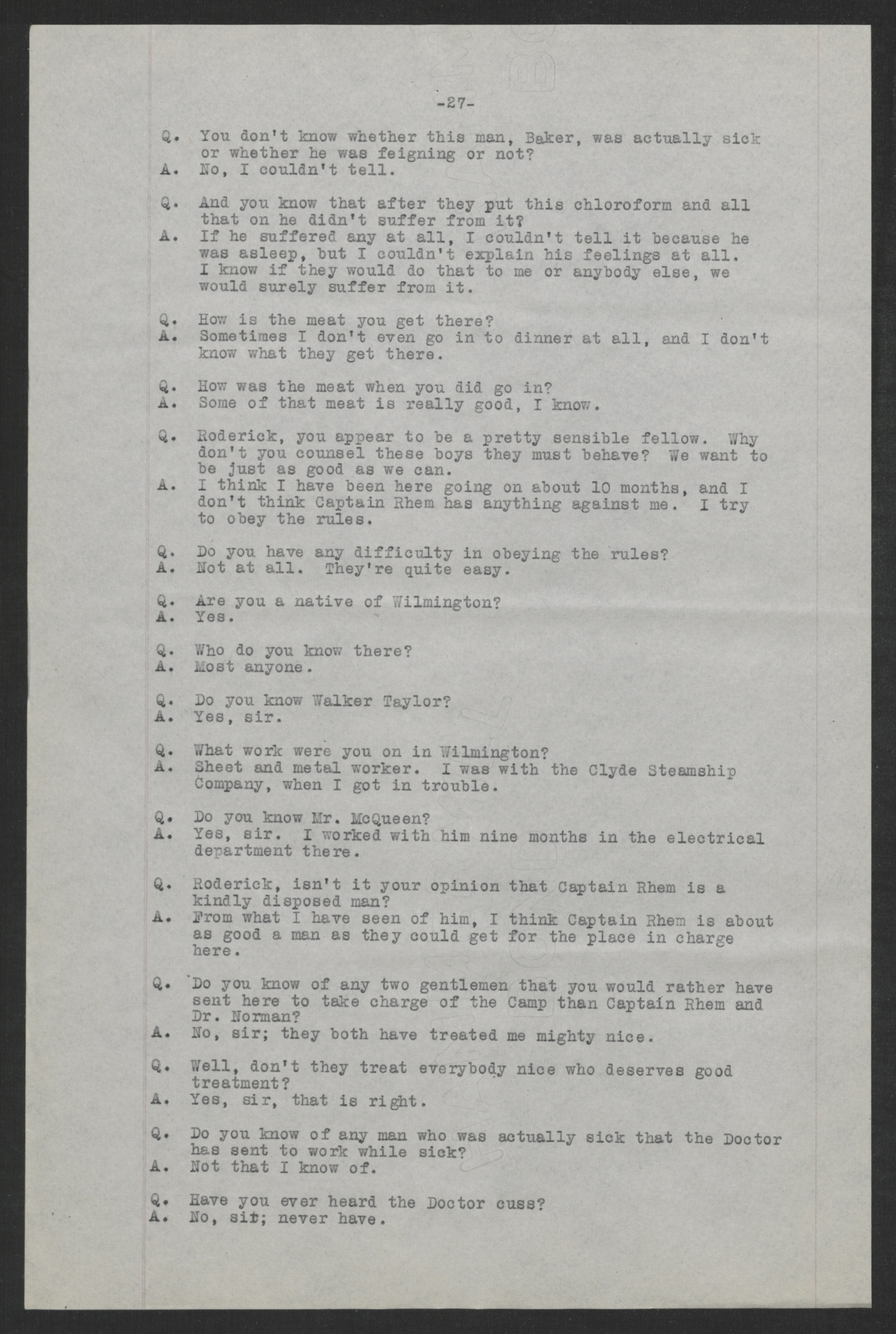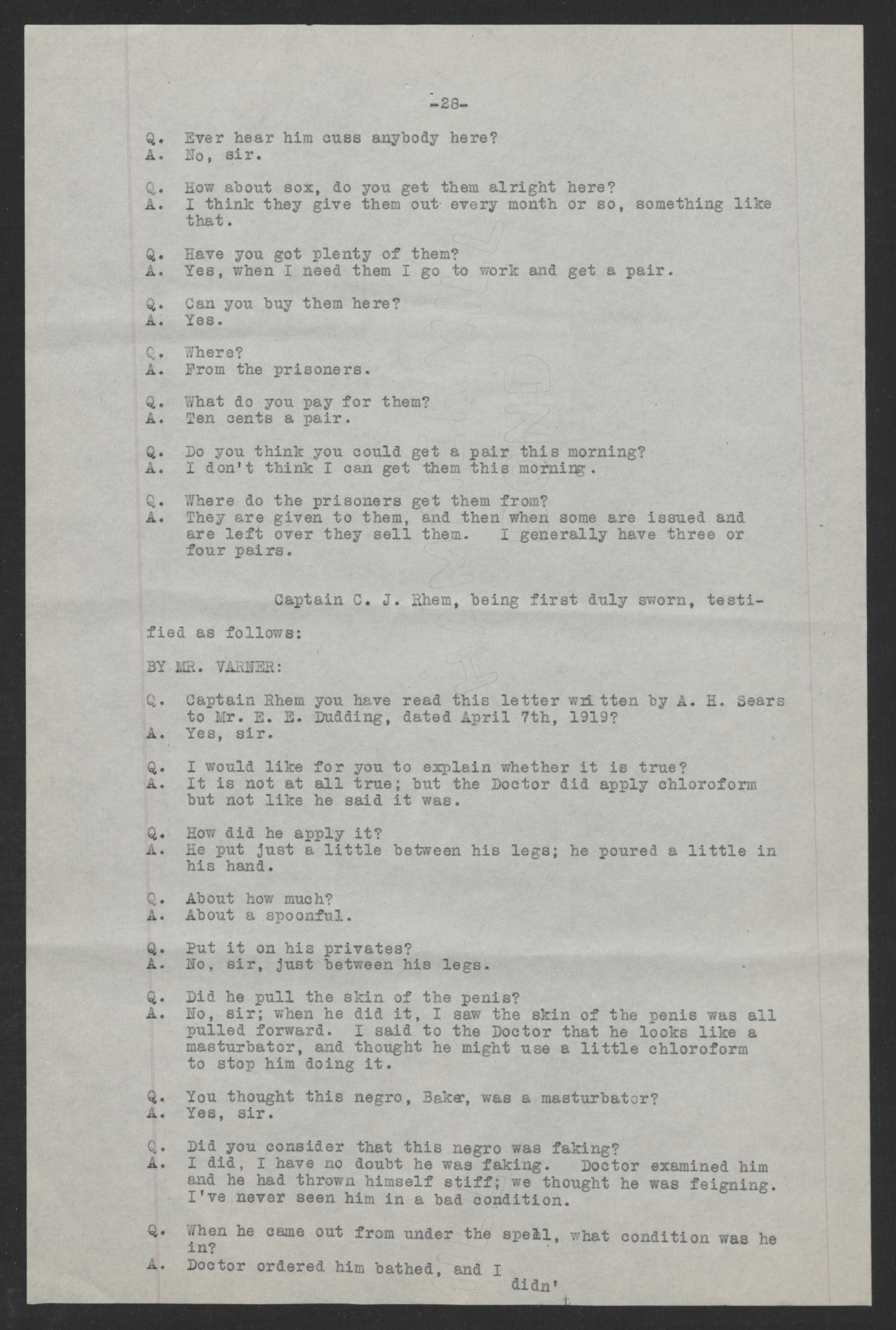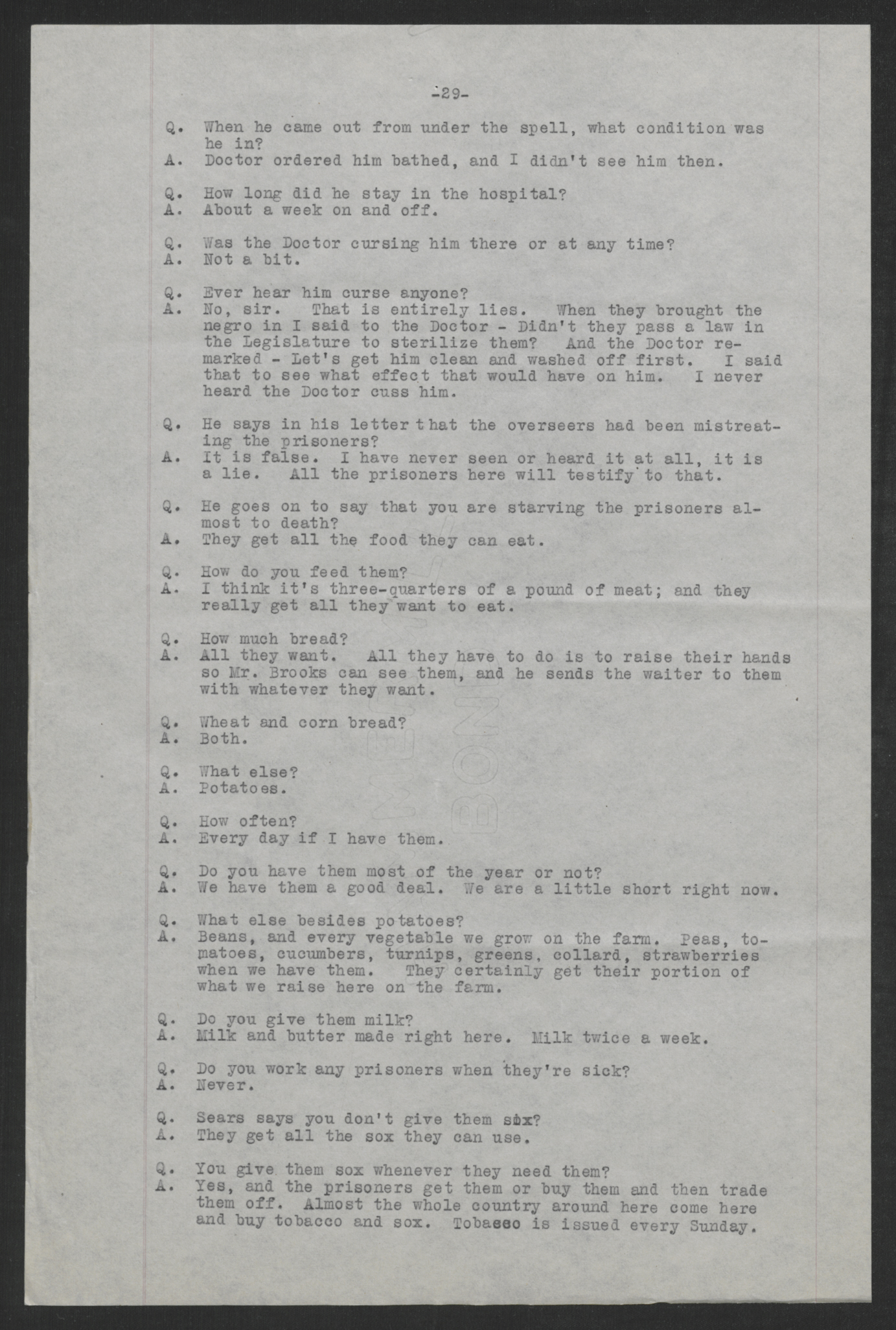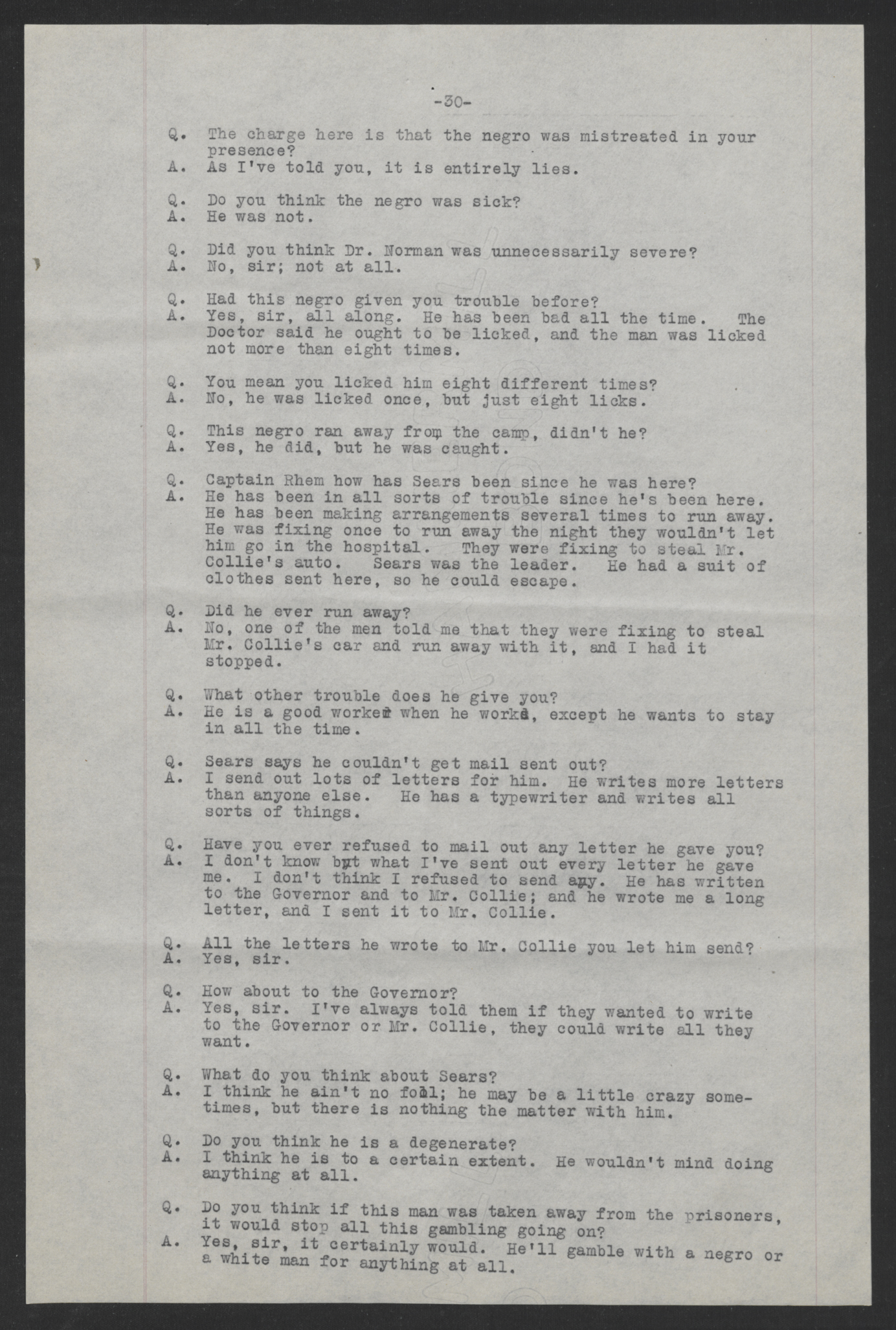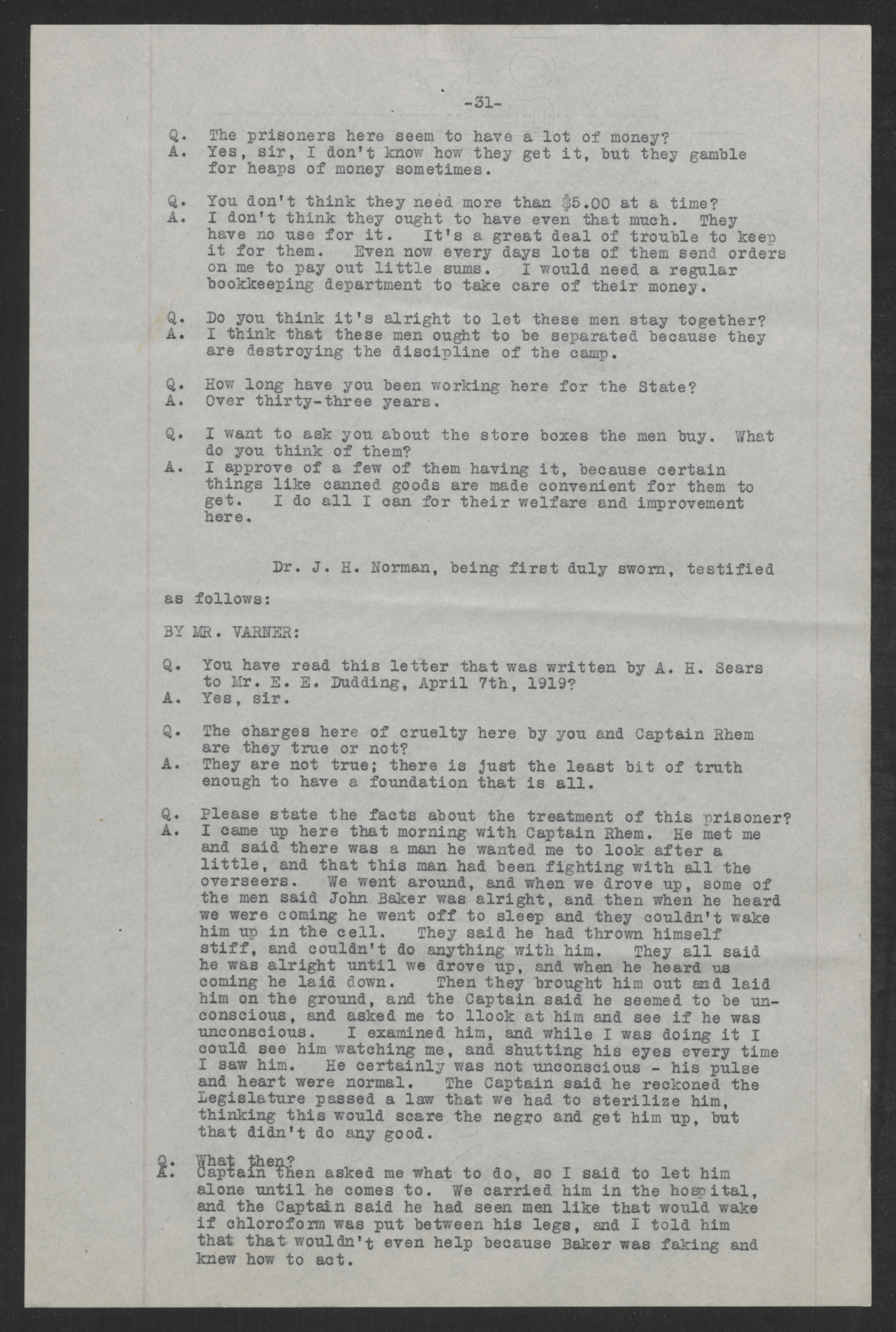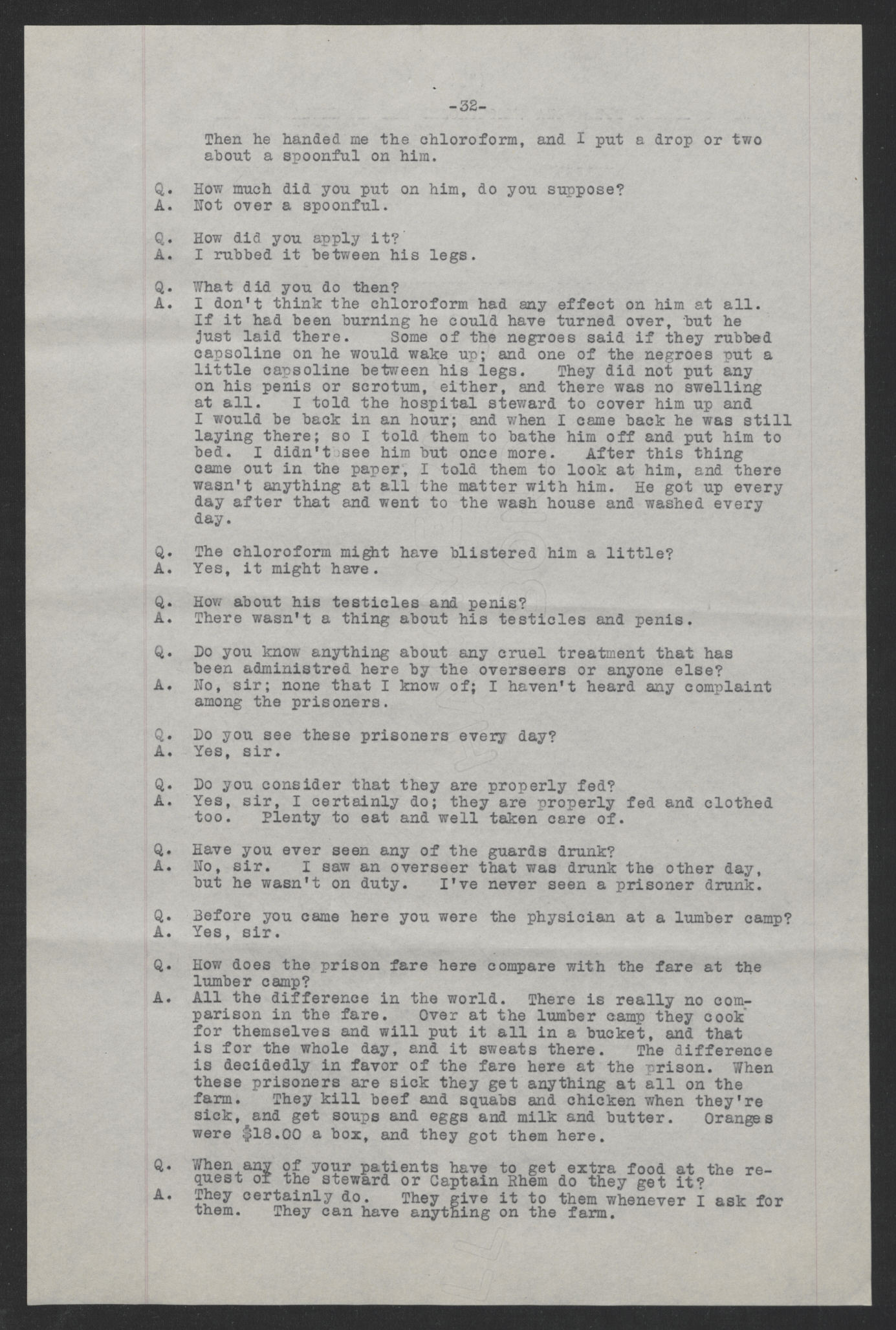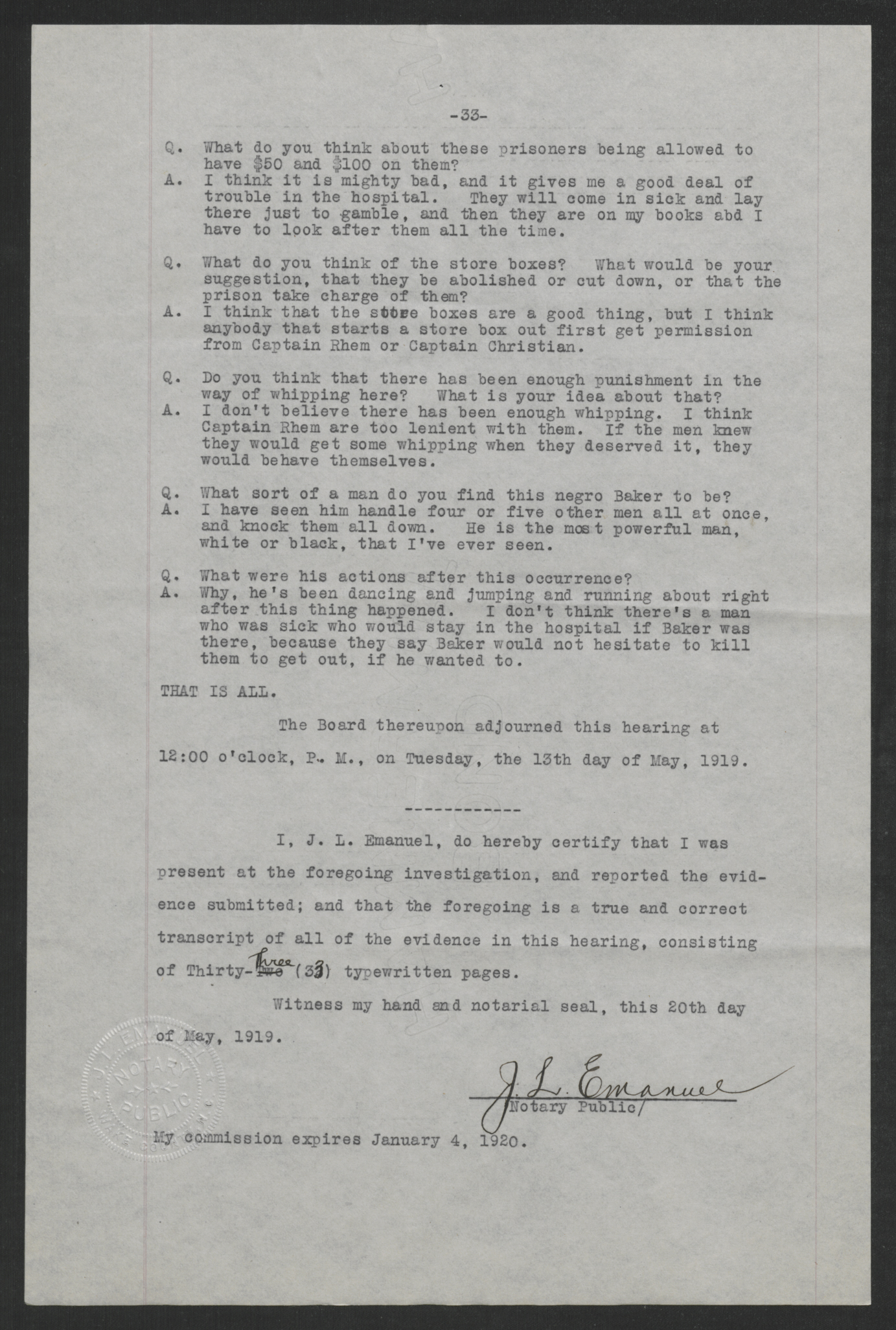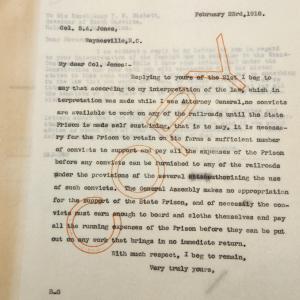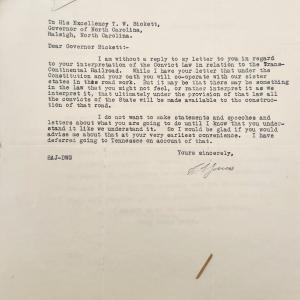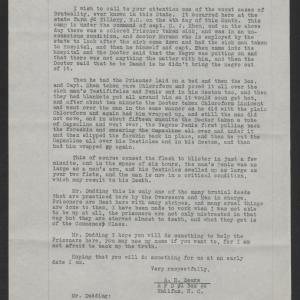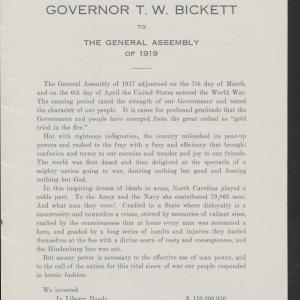IN THE MATTER OF THE INVESTIGATION OF THE CHARGES
MADE BY A. H. SEARS TO E. E. DUDDING.
On Monday, the 12th day of May, 1919, the Board of Directors of The State’s Prison, met at the State Farm, Halifax County, North Carolina, for the purpose of investigating the charges presented in a communication written by A. H. Sears, at State Farm, Camp No. 2, Tillery, North Carolina, to Mr. E. E. Dudding, President of Prisoners’ Relief Society, Washington, D.C.
MR. H. B. Varner, Chairman of the Board of Directors, Mr. W. M. Sanders, member of the Board, Mr. J. R. Collie, Superintendent of The State’s Prison, Captain C. J. Rhem, in charge of Camp No. 2, State Farm, Tillery, N.C., and Dr. J. H. Norman, Physician at the State Farm, were present. The investigation of the charges commenced at 9 o’clock, P.M., on the night of Monday, May 12th, 1919.
Mr. A. H. Sears, who preferred the charges referred, after being first duly sworn to speak the truth, was examined, and testified as follows:
EXAMINATION BY MR. H. B. VARNER, CHAIRMAN:
Q. Is this the letter that you wrote, Sears?
A. No, that is not the exact letter that I wrote.
Q. Well, is that a copy of it? Read it carefully.
A. Yes, sir; this is a copy.
Q. You have read this letter?
A. Yes, sir.
Q. Are all these statements true?
A. Yes, sir.
Q. Now, read that letter carefully. I want you to satisfy yourself that that is the letter you wrote, and that it contains the truth.
A. That is the truth.
Q. Where are you from, Sears?
A. Greensboro.
Q. How long have you been here?
A. Since the 6th of December.
Q. Only been here about five months?
A. Yes, sir.
Q. What were you sentenced here for?
A. Larceny of automobiles.
Q. How did you come to make this complaint to Mr. Dudding instead of to Governor Bickett or to Mr. Collie?
A. The reason it was made to Mr. Dudding, was because another man said he wrote and made the complaint to Mr. Collie and had not heard from it.
Q. Who was he?
A. J. C. Walker. He said he wrote to Mr. Collie and never got any reply.
Q. How do you know that Walker wrote to Mr. Collie?
A. He said he did.
Q. Do you know when Walker wrote to Mr. Collie?
A. I don’t know.
Q. How do you know about this man, Mr. Dudding?
A. I have known him several times.
Q. Where did you meet him?
A. I don’t know him personally, except I have heard a lot about him.
Q. Have you been treated alright here?
A. I haven’t been mistreated myself, but I haven’t been treated exactly as I should be.
Q. What has been done to you?
A. It seems when I first came to this Farm, bad news was brought with me, and when I was in jail in Greensboro, another feller and I broke jail, and then they had to bring me here, and that news followed me here on the farm, and all that news came and when the Sheriff brought me here he added a little bit more, and they told a lot of tales about me. And I was brought here and watched, and it looked like they were afraid I would do something.
Q. Nobody abused you while here?
A. No.
Q. Has Captain Rhem mistreated you?
A. He treated me very well, except some few little things that I would have any right to say anything about.
Q. Have you ever been treated wrong in any way?
A. The only thing seems that I can’t write to Mr. Collie, unless the letter must first go through the office and be read and unless it suits out there, it seems that it won’t go.
Q. Well, you know all letters are censored?
A. But Mr. Collie stated that there was no censorship at all of his mail, and I thought myself in writing to Mr. Collie if there was any kick coming he was the man. If I wanted to say something to Mr. Collie, and it didn’t suit Mr. Brooks, the overseer, it might not reach him.
Q. Have you seen any brutal treatment here?
A. Several little things have taken place.
Q. You saw this thing that you wrote about?
A. Yes. I saw it with 12 other men in the hospital.
Q. You refer in this letter to T. S. Euey?
A. Yes, I went to them personally, and they were willing to tell. There were 12 of us that saw besides these four here.
Q. You say Walker wrote to Mr. Collie about this thing and didn’t get any reply?
A. Yes, he certainly did.
Q. When did Walker write?
A. I don’t know.
Q. You say in your letter this thing happened on the 4th of April?
A. Yes, sir, that’s right.
Q. And your letter was written on the 7th of April?
A. Yes.
Q. Only three days after it happened?
A. Yes/
Q. If Walker did write, how could his letter reach Mr. Collie and an answer come back from him in less than three days?
A. I don’t know.
EXAMINATION BY MR. SANDERS:
Q. What is your given name?
A. Augustus.
Q. Augustus, have you read this letter carefully tonight?
A. Yes/
Q. Every word of it?
A. Yes, sir.
Q. Now, you say here in Paragraph One (Mr. Sanders read Paragraph One of the letter from A. H. Sears to Mr. E. E. Dudding, dated April 7th, 1919, and which will be attached to this document, marked Exhibit “A”). Do you mean to tell this Committee under your oath that that paragraph is absolutely true?
A. Yes, sir.
Q. How did you know this colored prisoner was sick?
A. Because I have been around sick people enough to know when a man is unconscious.
Q. Then that paragraph is true and you swear under oath that it is true?
A. Yes.
Q. Writing a letter is grave enough, but swearing to the statement is another thing?
A. Yes, I know.
Q. Now, Paragraph Two. (Mr. Sanders reads Paragraph two of this letter). Granting that your statement is true, how do you know different medicines?
A. I know most of the medicines used in this place.
Q. Could you swear to the use of the chloroform?
A. Yes.
Q. Did you see all that?
A. Yes.
Q. Were you there?
A. Yes.
Q. Did you take part in it?
A. No.
Q. Did you protest against Dr. Norman using it?
A. No, it wasn’t my place to do so.
Q. But you are sure he used chloroform, the chloroform liniment and the capsoline?
A. Yes, sir, he used pure chloroform first; and then chloroform liniment, and then the capsoline.
Q. And you know he did use all three of the articles set forth?
A. Yes.
Q. And you swear to that now?
A. Yes.
Q. Now, paragraph Three. (Mr. Sanders reads paragraph Three of the letter). You say it caused the flesh to blister in a few minutes. How many minutes do you call a few minutes?
A. Well, I don’t know.
Q. Well, you were there, how many minutes about?
A. About thirty minutes.
Q. Half an hour?
A. Yes, sir.
Q. Then you say - In the space of 6 hours, the man’s penis was as large as a man’s arm. Did you have a watch?
A. Yes, sir.
Q. And you especially kept time?
A. Yes, sir.
Q. Then you say - The man’s penis was as large as a man’s arm and his testaciles swelled up as large as your two fists. You think his penis was as large as my arm?
A. Yes, his skin was thick.
Q. And you swear to that now?
A. Yes.
Q. And that statement is absolutely correct?
A. Yes.
Q. Did the man die?
A. No.
Q. You said - The man is now in a critical condition which may result in his death. Why didn’t the man die?
A. I don’t know. As soon as this thing came out in the newspaper, the Doctor did everything he could to save the man. The Doctor treated him better than he ever treated him before. He even powdered him all over just like a baby.
Q. Don’t you get enough to eat?
A. No, sir, I do not.
Q. Aren’t you in good physical condition?
A. Yes, sir.
Q. You don’t look like there is anything the matter with you?
A. I spent $100 of my own money.
Q. How does your weight compare now as when you came?
A. Between 3 and 5 pounds less.
Q. Don’t you regard Captain Rhem as a fatherly and kind old gentleman?
A. I think he is alright.
Q. And he was present and permitted it?
A. He was present and never took any hand in it.
Q. He never remonstrated with the Doctor at all?
A. No, sir.
Q. Don’t you think the Doctor is a kind man?
A. I’d hate to tell you what I think.
Q. Then, you think he is a harsh cruel man?
A. Yes, sir.
EXAMINATION BY MR. COLLIE:
Q. When you came to Raleigh, what did they put you to doing?
A. Sawing wood the first three days.
Q. Then what?
A. Put me in the hospital to help.
Q. Treated you pretty good there?
A. Yes, sir, they treated me very good.
Q. And you liked it alright over there?
A. Yes, sir, alright.
Q. Then instead of your bringing a bad reputation with you from Raleigh, as a matter of fact didn’t the man who brought you here tell Captain Rhem to take care of you and treat you fine?
A. No, sir, he told everybody that I broke out of jail, and that he would have to keep a watch on me.
Q. But, don’t you know as a matter of fact that I told Capt. Rhem to take care of you when you came?
A. No, sir.
Q. Sears, what kind of drug were you taking before you came to Raleigh?
A. None, at all.
Q. Well what kind of drug was it you used in the hospital in Raleigh?
A. I didn’t use any drug at all. I think that man, Cole, is the cause of my being sent from the hospital to this here Farm. Mrs. Wood, one of the nurses, told me when I worked at the Hospital during the flu to take some sleeping tablets, and I took them, and Mr. Cole was in there when I did and he reported that I was taking drugs.
Q. Weren’t you taking some drugs?
A. No, sir, that is all I have ever taken in my life. Only a couple of those sleeping tablets. Never was sick and never needed any drug.
Q. Who was the other lady nurse there at the hospital?
A. Mrs/ Barclay.
Q. Didn’t she stop you one day from taking drugs?
A. No, sir, she happened to be in there when I took a couple of them.
Q. Didn’t you take more than a couple? Mrs. Barclay rushed in to me and said you just spilled a whole fist full of those tablets and gulped them down.
A. No, sir, I didn’t take them.
Q. You remember when you were taken out of the hospital?
A. Yes, sir, it was because of Mr. Cole.
Q. No, Mrs. Barclay reported that you were taking drugs, and I had to take out of the hospital?
A. No, sir.
Q. As a matter of fact, isn’t the basis of your complaint because Captain Rhem didn’t give you the hospital work when they put you to work?
A. No, sir.
Q. And they wouldn’t put on the hospital, but put someone else in?
A. No, sir.
EXAMINATION BY MR. VARNER:
Q. Sears, according to your letter, this is only one of many brutal deeds committed at this camp. Is that true?
A. That is perfectly correct.
Q. Well, what are the other brutal deeds you talk about?
A. I can’t tell you right out, but I have written out a list of them.
Q. You just stated you have been fed?
A. I said I have spent $100 of my own money for it.
Q. Where did you get the $100?
A. I expect I have handled twice that much.
Q. Where do you get it?
A. Some from home and some gambling.
Q How much money did you bring with you?
A. $20.00, and then I had $7.50 up there.
Q. That was supposed to be all you had?
A. No.
Q. You deposited that money you had in the office when you came?
A. Yes, what I did have.
Q. Who sent you money to spend?
A. My wife sends me money.
Q. Now, Sears, I want you to go and bring here the list of brutalities you spoke of.
A. Yes, sir.
---------
Q. This is the list of brutalities. 1. “Drink out of the same dippers with the negroes, and some of them are diseased, work all the week with them and be kept separate on Sundays.” Why did you drink out of the same dipper with negroes? Don’t you know it is absolutely untrue? Don’t you know where the whites and the negroes drink water are in two different ends of the camp?
A. Yes, I mean in the field.
Q. But there are two dippers, one for whites and the other for negroes?
A. I know but they are not kept separate.
Q. Now, 2. “The victuals are always served cold, and the meat isn’t fit for a human being to eat.” Is that true?
A. Yes, sir.
Q. 3. “Vegetables, turnip tops, rape or collards, begetables just cropped and cooked with bugs and worms in them.”
A. That’s true.
Q. 4. “Coffee served cold and very weak.”
A. Yes, sir.
Q. 5. “Wheat bread once a day usually it is fixed very well, what little we get.”
A. That’s true.
Q. 6. “Supper cold corn bread & black molasses with a very small piece of meat.”
A. That’s right.
Q. 7. “Breakfast wheat bread and black molasses & a small portion of the same meat.”
A. Yes.
Q. 8. “Dinner some kind of salid, or dry peas & corn bread with the same meat.”
A. Yes.
Q. 9. “I look to get some good meat while this investigation is on.”
A. Yes.
Q. 10. “There is two places where they keep the meat, they never show the second place. Ask me where it is.” Where is it?
A. Over in the cell house.
Q. The good meat?
A. No, the good meat is in the smoke house.
Q. 11. “If they hear of any committie comeing here they stop help enough to fix up for it.”
A. Yes.
Q. 12. “They never give any kind of fruit at all, and supper & breakfast are always the same.”
A. Yes.
Q. 13. “If any prisoner disobays the rules, He or She is sevearly beaten.” Have you ever seen anybody whipped here?
A. Yes.
Q. Who?
A. Three, I believe.
Q. Who were they?
A. I don’t know. One was on Eastern Bay.
Q. Severely beaten?
A. Yes.
Q. Who else were severely whipped?
A. Two of them here, one was a one-legged feller, and the other was sent back.
Q. Who whipped them?
A. Luther Blue.
Q. Did you see him whipped?
A. No, I heard heard about it, I didn’t see.
Q. Well, but you say this is the list of brutalities you know about?
A. But, don’t you see other names to it. I did write them.
Q. 14. “Our stewart Mr W. D. Brooks will curse any prisoner if he askes for a piece of wheat bread, or meat saying, theres no more for you.”
A. Yes.
Q. 15. “I have heard the overseersm curse prisoners for just any little thing, for instance, talking or smoking.”
A. Yes.
Q. 16. “We only get one pair of cheap sox every three months.”
A. Yes.
Q. 17. “Our stewart mails only such letters as he wishes to, and destroys the rest, always reads them before mailing them.”
A. Yes.
Q. 18. “Our sell, to my personall knowledge, wasnt scrubed for 14 months.”
A. Yes, sir.
Q. There must be a mistake about that. You said you’ve only been here since last December?
A. Yes, but I told you other men wrote that. Not only me.
Q. 19. “I have known one prisoner to go to tillery and come back drunk twice. He is an “A” man.”
A. Yes.
Q. 20. “The man in charge of the women has been known to punish some of them with a stick, there is evidence that they are used for other things, Personal Lust.” Have you got any evidence of that?
A. There is a small child over there.
Q. Have you any evidence of any person did it?
A. I can’t say who it was.
Q. Have you any evidence of anybody who has ever had anything to do with it?
A. No, sir.
Q. 21. “Mr. Collie is very hard to get to see, as he always comes when we are in the field, and he does not have time to stop and talk when one of the prisoners, wants to talk to him.”
A. That’s true.
Q. 22. “Some of the prisoners are afraid to say anything to Mr Collie on account of punishment here, and these will tell you that they are being treated all right.”
A. Yes.
Q. 23. “The Doctor abdCapt. Rhem will punish one sick or well.”
A. Yes.
Q. Don’t he give you medicine?
A. H doesn’t give you the medicine that you need, because I have been very sick, and all he said was to let him look at my tongue, and he only gave me oil.
Q. You don’t think you are a better doctor than Dr. Norman?
A. No, but I don’t think he ought to put me off with oiL. I know what I need when I’m sick.
Q. 25. “When they heard about the committie comeing here, the Doctor came in the Hospital & had Baker bathed and axually powdered him, where he burnt him when he was unconscious.”
A. Yes.
Q. 26. “Once before the Doctor had Baker punished when he was sick, the Doctor had him beaten twenty lashes, they beat him so sevearly that he went out to work sick, after staying in the hospital chained down on milk three times a day, Baker has crazy speells at times and isnt fit for work at that time.”
A. Yes.
Q. You said a while ago you never knew the Doctor to be brutal before?
A. I know he was whipped before this thing took place.
Q. 27. “Our water boy is very indecent & he is allowed to put our food with his hands, I J. C. Walker can tell you how he is idecent.”
28. “When a man brakes a rule, here and loses his grade he hasnt got any chance to get it back.”
29. “I J. C. Walker lost my clothes Apr, 8th-1919 because I slipped out a letter to Rev, J. D. Moore of Raleigh, I was Promptly given to understand that ide be thrashed like Hell next time, No chance to live down a bad record.”
30. “I dont think that I done rong by writing to Mr Moore and I ask the committie to give me back my clothes, and order me moved to some other camp.”
31. “Mr Brooks has several names of prisoners, that he is punishing by taking their tobacco away from them, last sunday he failed to take it, from them, But said “I have not forgotten you men on my list, I just hate to take this Rotton Tobacco from you, and they give out a better grade than they had been giving out.”
You think Mr. Brooks is a very bad man?
A. I think he is alright with me so far.
Q. 32. “Guard Dean Bryant struck sam wilson with a large stick, rev, C. N. Hughs saw the negro just after he was struck while he was bleeding.”
33. “Every morning we are locked out in the hard, in the winter we suffer from the cold/”
34. “Some of us are not allowed to stop in the hospital when sick.”
35. “We humbly ask that we be given fruit occasionally, and given wheat bread for breakfast & supper, and that the Management have our sox washed and placed with our other clothes, each week.
“We ask that we be worked separate from the Negroes, That our food be served while hot, that the State buy a decent grade of Meat & that we be given sugar for breakfast to put in our coffe, the paper stated that we are well fed Cold corn bread, a very small piece of meat & black molasses every night.
“We ask that our mail be delivered every night in the place of twice a week & that the State furnish stamps, We ask to be allowed to write & seal our Mail to our Superintendent or the Governor, that we be furnished coppies of the Laws enacted 1917 & 1919 and give a Nother Stewart.2
Are these all your charges?
A. Made by someone else.
BY MR. SANDERS:
Q. You typewrote them?
A. Yes, sir.
Q. The meat shipped in here is good, isn’t it?
A. I don’t know about it. The meat shipped in here isn’t any good at all.
Q. Is the meat spoiled?
A. It doesn’t smell good, and it tastes just as bad as it smells.
Q. Do you mean that the meat is what is known as tainted or spoiled meat?
A. I don’t say it is rotten, it just seems to be right yellow it’s old.
Q. Then, you wouldn’t state that you had seen spoilt meat on the table?
A. I don’t say it is spolt, I say it is so old and rank that you can’t eat it.
Q. Don’t you know that the country people around here bring in North Carolina meat and swop it for the Western meat that you get here in addition to the meat killed on the farm?
A. The meat killed on the farm is alright; it’s the meat that is shipped in here that’s rotten.
Q. But as a matter of fact don’t the farmers here swop their meat for this meat that’s shipped in here?
A. I don’t know about that. I never found a piece of meat in the condition in which it is here. Mr. Hughes told me that the meat isn’t fit to be eaten.
Q. Haven’t you always been given a chance here to show yourself?
A. Yes.
Q. Hasn’t Captain Rhem always given you a chance to do good?
A. Yes, sir.
Q. Hasn’t Captain Rhem always done all he could for you.
A. Yes, I have no kick at all against Captain Rhem.
Q. Haven’t you told everybody around the Farm that when you got out you would put out all the present hospital people?
A. No, sir; I never did.
Q. You said you spent something like $100 for food. Where did you get this food?
A. Buy it in the camp.
Q. Who did you buy from?
A. Several people here.
Q. Who?
A. English in the kitchen handles lots of it, canned goods, and all that stuff.
Q. Anybody else?
A. Three or four on the colored side do the same thing. They are store boxes that they order from out of town.
Q. Where were you before you came here?
A. I was in the Navy four years and in the Army one year.
Q. You were sent here from Guilford County?
A. Yes, sir.
Q. What were you sentenced here for?
A. Auto larceny; the theft of two Fords.
Q. How many automobiles have you been accused of stealing?
A. Those two, only two.
Q. Were you tried before a jury there?
A. Yes.
Q. And that jury found you guilty?
A. Yes, sir.
Q. Don’t you think that the thing that concerned you the greatest was to reform and become a good man and pull with these people and try to maintain order?
A. I have been pulling with them as hard as I can, but it is all pulling against me.
Q. Mr. Collie is as just and kind to you as to others?
A. Yes.
Q. And Captain Rhem is too?
A. Yes.
Q. You don’t think that this continued making of complaints and charges will help you any?
A. No, sir; I don’t expect it to help me.
Q. What Judge presided in Greensboro at your trial?
A. Judge Adams.
Q. Isn’t he one of the best men you ever knew, and one of the kindest judges?
A. Yes, sir; he knew me all my life.
Q. And he tried your case?
A. Yes, sir. He was living where I was born and raised.
Q. And he sentenced you to the penitentiary?
A. But he didn’t know me then.
Q. You mean he wouldn’t have sent you to the pentitentiary if he knew who you were?
A. Well, he didn’t know I was the man who was in his house a thousand times.
Q. He would have sentenced you if he thought you were guilty, not who you were?
A. No, sir, I don’t think he would.
Q. But he did sentence you?
A. Well, I wasn’t guilty.
Q. Don’t you think Judge Adams is a good man?
A. I can’t say, I haven’t a thing against him.
Q. The Court then treated you wrong?
A. I didn’t say that; but I was innocent of the charges.
Q. You think then that you are an innocent and not at all guilty?
A. I don’t say that. I am not guilty of that charge for what I was sent here. They didn’t have any evidence against me. If I had my just dues, I would have been here for 60 years.
Q. You mean to confess before this Committee and make this voluntary statement, that if you had your just deserts you would be sent here for 60 years?
A. There is no man walking the streets who isn’t guilty of a lot of crimes.
Q. You think every man here, Mr. Varner, for instance would be in prison if he had his just dues?
A. Yes/
Q. Do you think that Mr. Collie here would be in prison?
A. Yes, sir, everyone.
Q. Even Govenor Bickett?
A. Yes, sir.
Q. And President Wilson?
A. Yes, sir.
Q. So, as I understand you to say, that if you had your just dues you would be sentenced here for 60 years?
A. I wouldn’t say in this penitentiary here. I would say if I had my just dues I would have to serve for 60 years. I don’t believe there’s a man who wouldn’t be in the pen.
Q. So, you think you ought to have 60 years in the penitentiary, but you say you’re not guilty of this crime of the larceny of two Fords?
A. They didn’t have no evidence on me.
Q. Sears, do you recall a single person who is doing his part here who isn’t in A grade, and has all the liberty here? Do you recall a single one who is kept back?
A. Yes, some have been here 5 or 6 years and haven’t got a black mark and are kept back.
Q. Well, that’s only guessing, because you’ve only been here a few months and you don’t know. Sears, why didn’t you make these charges to Governor Bickett or to Mr. Collie, or to myself or to some other member of the Board instead of to Mr. Dudding?
A. I don’t say what made me write to him.
Q. Have you any reason for not writing to us?
A. I don’t know.
Q. Where did you hear of Mr. Dudding?
A. I read about him different times.
BY DR. NORMAN:
Q: How many men have you known me to send out when they were sick?
A. I know fellers who said they were sick. I can't tell if they were sick. I only have their words for it.
Q. Don't you think, Sears, that in the morning if I didn't run them out, that more than half of them would play sick?
A. I might go in sick, and then you would send me out sick.
Q. Don't you know when I went to Pinehurst, and they all heard that I was going to be away, they all played sick, and then I came back unexpectedly early, and they were all sick?
A. Yes, that's right.
Q. When this thing occurred you write of, you had been marked out of the hospital three days?
A. No, sir, I stayed in the night before and I wasn't marked out.
Q. You mean to say you were still staying in when you had been marked out?
A. I am not sure. I don't think it is exactly correct.
Q. But it is correct?
A. I was on the sick list.
Q. You weren't on the list at all. You were marked out alright/
A. I was on that day.
Q. You had then been marked out two days?
A. I am not sure, but I think you marked me out the day before.
Q. You said you hate to tell the Board how brutal I am. Well, why don't you?
A. I didn't say you were brutal.
Q. Tell all the brutalities I practiced around there?
A. No, they just asked me what my opinion was about you.
Q. About Baker, is that the only thing you formed your opinion?
A. I guess so; that's enough.
Q. You haven't seen me do anything else?
A. No, sir.
Q. Haven't heard me say - Damed?
A. No, but you said Damned.
Q. How many automobiles did you get?
A. I never got one.
Q. You never did steal an automobile?
A. No, sir. No proof that I ever had anything to do with it at all.
Q. So, you are an innocent man?
A. I don't claim to be innocent, but I am innocent of the charges against me.
Q. Is that all the brutalities you know I practiced there?
A. Yes.
Q. Don't know any more?
A. No, sir.
Q. You never made this report to Mr. Collie at all?
A. No, sir. I made it to Mr. Dudding, and Walker told me three or four days before this letter went that he wrote to Mr. Collie and got no answer.
Q. You wrote the letter for Walker on the typewriter?
A. No, sir, I never did.
Q. Any other typewriter over there?
A. No, sir, I never wrote a letter for Walker in my life.
BY MR. VARNER:
Q. You wrote in one of your letters to Mr. Collie that your friends turned against you, and you wrote that you can't blame them. What do you mean by that?
A. I can only say that is true.
Q. Why is it true? Why have they turned against you?
A. I don't know.
Q. If you spent $100 for something to eat, why didn't you buy some sox?
A. Nobody sells them.
Q. Aren't they trading them here?
A. Yes, sir.
Q. Don't you know there's a big trade on tobacco and sox?
A. There's only one man that buys anything here and sells it. I can't get any sox at all.
Mr. T. S. Euey, after being first duly sworn, testified as follows:
EXAMINATION BY MR. VARNER:
Q. Euey, you have seen this letter written by Sears?
A. Yes.
Q. We want to find out from you the truth about it. Are the statement in this letter true?
A. I didn't see what happened at all.
Q. You didn't see it?
A. No, sir.
Q. Did you see this negro at all?
A. I, saw him afterwards.
Q. What condition was he in afterwards?
A. Bad, but I don't know what his condition was before.
Q. I will read Paragraph One of Sears' letter. (Mr. Varner reads Paragraph One) Are these statements true?
A. No, sir, I don't know anything about that.
Q. Now, Paragraph Two (Mr. Varner reads Paragraph Two).
A. I don't know anything about that.
Q. Paragraph Three (Mr. Varner reads Paragraph Three).
A. Well, he was in bad shape; but what caused it I don't know.
Q. In what bad shape?
A. His testacales was swelled.
Q. How much were they swelled?
A. They looked to me as large as my fist.
Q. Which testicale?
A. Both of them as large as my one fist.
Q. How about his penis?
A. It was swelled some.
Q. How big was it?
A. I don't know. Similar to my wrist. But he's a big nigger, and most niggers have pretty good sized ones.
Q. Now, Paragraph Four. (Mr. Varner reads Par. 4).
A. Aas far as the food is concerned, it could be better. I eat very little of it, but I expect I could eat it. I buy two-thirds of the food out.
Q. Where do you buy it?
A. These fellers here have little store boxes.
Q. Did you find any meat rotten?
A. Some don't look good to me.
Q. Ever lived on a farm?
A. No.
Q. Where were you raised?
A. In Cabarrus County.
Q. Take the meals out here, wouldn't you consider them as a par in quality and quantity with what you get in a cafe?
A. I couldn't say, because I don't know. The quantity if well prepared is alright. It could be prepared better.
Q. Have you ever seen a soldiers' camp?
A. No, sir.
Q. You have vegetables every day?
A. Yes, sir.
Q. Irish potatoes?
A. No, sir, not since I've been here.
Q. How long have you been here?
A. Over a year. I don't eat in the dining room. There may have been potatoes. I have been treated alright with the food and all. I have no kick at all.
Q. Has Captain Rhem treated you alright?
A. He has treated me like a gentleman.
Q. Has Dr. Norman treated you alright?
A. I have been in his care and he has treated me as fine as any man could.
Q. Have you seen anybody mistreated here?
A. No, sir.
Q. Have you seen Mr. Brooks mistreat anybody?
A. No, sir.
Q. You get all the sox you want?
A. Yes.
Q. All the other clothing you want?
A. Yes, sir.
Q. Do you ever lack anything?
A. I get all I want when I want them.
Q. Now, Sears has furnished us with a list of brutalities he says were practiced at the Camp. I will read them to you, and I want you to tell me whether they are true or not. First: (See Exhibit "B", attached).
A. No, sir.
Q. 2.
A. I have eaten the meat myself many times.
Q. Third.
A. I never seen but one worm in vegetables since I've been here.
Q. Have you seen the vegetables cleaned?
A. Yes, sir, I saw a worm in a white turnip, but only once since I've been here over a year.
Q. Even with greatest care you might sometimes find a worm?
A. Yes, sir, I've been in the cafe business and that's true.
Q. Fourth.
A. I can't say about that, because I get mine hot always. No kick about that. No kick about the coffee at all.
Q. Fifth. Doesn't a man get all the bread he wants?
A. He just has to hold up his hand and he can get all the bread he wants.
Q. Sixth.
A. I think that is true.
Q. Isn't the supper as warm as it can be served for 150 men?
A. Yes, I think so.
Q. Seventh.
A. Yes, sir.
Q. Eighth.
A. Yes; not the same meat, but another piece.
Q. Eleventh.
A. I can't say they do that, because I have been attending cell for 8 months, and they've never asked me to do anything extra if anyone came.
Q. Twelfth.
A. I haven't had any fruit.
Q. Thirteenth.
A. I don't know about that; I've never seen one. I have never heard anyone yell or holler.
Q. Fourteenth.
A. He never has cussed me. I've never heard him cuss anybody.
Q. Fifteenth.
A. No, I've never heard them cuss anybody.
Q. Sixteenth.
A. I don't know how often they give out sox. I get enough to wear.
Q. Seventeenth.
A. I don't know about that. All the letters I have handed him he has mailed them. If he has destroyed them, I don't know it. I have always gotten replies.
Q. Eighteenth.
A. That is a mistake because I have scrubbed it myself twice since I've been in there. That is not true at all. I've scrubbed it twice since December.
Q. Nineteenth.
A. I don't know about that.
Q. Have you ever seen any of the prisoners drunk?
A. No, sir.
Q. Twentieth.
A. No, I don't know anything about that.
Q. Twenty-first.
A. I don't know about that. I could see him all I wanted to.
Q. Twenty-second.
A. I don't know. I wouldn't be afraid to speak to him.
Q. Haven't you seen lots of the prisoners come to speak to him?
A. I have seen them come and shake hands with Mr. Collie.
Q. Have you ever seen them punished for that?
A. No, sir, I don't believe that's true at all.
Q. Twenty-third.
A. Well, I have been under his care, and I have no kick coming; he has treated me mighty nice.
Q. Twenty-fourth.
A. I don't know about that. They never have treated me so. I think they would treat everybody kindly. They talk to me all the time just as nice as I wish any man to talk with me.
Q. Twenty-fifth.
A. I don't know.
Q. Twenty-sixth.
A. I don't know.
Q. If you ever needed sox couldn't you buy them just as you did the food?
A. Most certainly. But they gave me all I wanted.
Q. Have you been noticing Sears?
A. Not especially.
Q. From your observation of him don't you believe he is not exactly balanced?
A. I don't know; I've thought sometimes he is a little off and then again he is alright.
Q. Wouldn't he impress you as a man who has been addicted to drugs some time in the past?
A. I don't know, sir.
Q. You have access to every building you want?
A. Yes, sir, I can go to every building I want.
Q. Have you ever heard any yells or beatings going on?
A. No, sir.
Q. And being around as you were you could have heard it?
A. Yes, but I never heard it.
THE Board adjourned at 12:00 o'clock, P.M., to reconvene the next morning.
---------
On Tuesday, the 13th day of May, 1919, the Board reconvened in the office of The State Farm, at 9:30 A.M. In addition to the members and officials present at the session Monday night, Mr. B. F. Shelton, member of the Board, was also present.
John Baker, being first duly sworn, testified as follows:
Q. Your name is John Baker?
A. Yes, sir.
Q. How long have you been here?
A. About the fourth year.
Q. How are you getting along?
A. Alright.
Q. Sears says you were very badly treated here. Tell us all about that?
A. I don't know anything about that myself.
Q. The Doctor ever mistreat you in any way?
A. No, sir, I don't know.
Q. Did Captain Rhem ever mistreat you?
A. Not as I know of myself.
Q. Did he give you plenty to eat?
A. I got plenty of it. But not what I wanted.
Q. Didn't you get what you wanted?
A. No, sir.
Q. Well, what did you want - chicken?
A. No, sir.
Q. Did you want jams and jellies?
A. I asked him to give me what he wanted to. I reckon he would have given it to me if I asked him. I don't know what I wanted.
Q. Never been mistreated by the Doctor?
A. No, sir, not that I know of.
Q. Wouldn't you know it if you had been treated wrong?
A. Yes, sir.
Q. You ran away the other day and they caught you?
A. Yes, sir.
Q. What was your idea in trying to get away?
A. I don't know.
Q. What are you here for?
A. Night burglar.
Q. Where did you burgle?
A. Mrs. Glass's in Raleigh
Q. How long is your sentence?
A. Twenty years.
Q. What sort of shape are you in now? How are you feeling?
A. Something feels very bad.
Q. Taking any medicines?
A. I take some sometimes.
Q. How do you feel bad?
A. I didn't say I feel very bad.
Q. Where is your trouble when you are sick?
A. Sometimes it hurts me down in my leg, some pains there sometimes/
Q. Don't you remember when Captain Christian sent you to Raleigh to see Dr. Knox, wasn't you alright?
A. I don't know.
Q. Weren't you making out you were sick when you wasn't sick?
A. No, sir.
Q. You haven't done any work here this year, have you?
A. Yes, sir.
Q. How many days do you reckon you've worked this year?
A. I aint keeping it.
Q. Do you reckon you've worked as much as a week?
A. Yes, sir; I've worked as much as anybody. When I see others stop I top too.
Q. Do the others ever stop working?
A. Yes, sir, and I stop too.
Q. You were a good hand in No. One?
A. Yes, sir.
Q. Do you want to go to another camp?
A. I aint particular about going to another camp.
C. H. Snider, being first duly sworn, testified as follows:
BY MR. VARNER:
Q. Your name is C. H. Snider?
A. Yes, sir.
Q. Where are you from?
A. Charlotte.
Q. How long have you been here?
A. About four months.
Q. Did you see this letter written by A. H. Sears to Mr. E. E. Dudding, April 7, 1919?
A. Well, I can't say.
Q. Well, suppose you read it carefully.
A. Yes; I can't say this is the one I saw or not. I signed one that was written by Sears and witness of the facts I saw.
Q. You read this and see if this is the letter?
A. Yes, sir.
Q. This is the letter that you signed?
A. This is a copy.
Q. How do you know it is a copy?
A. Because my signature is not on it that I wrote. I signed it/
Q. But this is a copy of that letter?
A. Yes.
Q. You have been here four months?
A. Not hardly.
Q. Sentenced for what?
A. First degree murder.
Q. You are an ex-soldier?
A. Yes, sir.
Q. Go ahead and tell us about the cruelty that you say was done at the hospital.
A. I was there on the 4th of April. Somewhere between 9 and 10 o'clock. Three negroes worked in the yard and they came carrying Baker in, followed by the Doctor and Captain Rhem. Captain Rhem said "Cut him and cut him clean". I didn't know what he meant. I thought they were going to operate on him, but I heard the Doctor call for the chloroform and he applied the chloroform to the feller's testicles and covered him up with a blanket and some cotton and let him stay like that something like 5 minutes. Captain Rhem said "He much must be throwing himself in a fit". And the Doctor then called for the liniment and he poured about half a pint of this liniment and rubbed him and wrapped him up in three blankets. And then he laid that way for something like the same length of time. And the negro hadn't yet moved and Captain Rhem said "Wake him up." And then I learned that the negro was so unconscious he was asleep. Then they got capsoline and the Doctor taken a tube and squirted it on, and a negro by the name of Snow put it on. Then they wrapped him up and Captain Rhem went out, and the Doctor stayed and inquired about the mail man and left. He came back that evening about 3 o'clock and the negro still lay unconscious and hadn't moved in no way, shape or form. And when the Doctor came back he had the 3 men come back in the hospital and take him on the bed where I had seen him chained and told the niggers to wash him. And then about 6 hours after this stuff was applied the negro woke up. So he spoke to me. None of the other niggers would go up to him, they said they were afraid of catching it. So I got up and went over there and held his hands. When I held his hands his penis was swelled up almost as large as my arm.
Q. You're sure it was your arm - not your wrist?
A. I guess it was my wrist. And around the skin at the head of it was a ridge as large as my thumb, and his other bag was swollen, it wasn't as large as my two fists, but nearly as large, and it was blistered. I held his hands while the fellers washed him, and then they got vaseline to grease him, and the men made remarks that the blisters was as large as my thumb. Then I turned him loose and went on back over to my bed. I haven't seen him since that time, that is, I haven't seen the stuff put on him.
Q. You don't know whether the negro is living now or not?
A. Yes, he was in the hospital.
Q. How long was it before he was able to get out?
A. He stayed in there something over a month before they let him go out.
Q. This occurred on the 4th of April, and this is May 13th; so he has only been out about a week?
A. Well, he's been out longer than a week.
Q. How long have you been in prison?
A. I got here on January 27th.
Q. How long have you got?
A. Ten or fifteen years.
Q. Where is your home?
A. Born and raised in Guilford and Randolph Counties.
Q. How long have you lived in Charlotte?
A. Never lived there.
Q. Has Captain Rhem ever mistreated you in any way?
A. No, sir.
Q. Has Dr. Norman ever mistreated you in anyway?
A. I can't say he mistreated me any. He marked me out when I wasn't able to go out; I told Brooks I wouldn't go out.
Q. Were you raised on a farm?
A. No, sir.
Q. What have you been doing all your life?
A. My parents live all around cotton mills. I was a young man and then went to the Army.
Q. What caused you to kill Mr. Winters?
A. He insulted my wife in my presence.
Q. Was he a North Carolina man?
A. Yes, sir.
Q. Was he a soldier?
A. No, sir.
Did you hear Dr. Norman cussing Baker?
A. No, sir.
Q. Isn't it a rule before you go to bed to make you take a bath?
A. I have never taken a bath before I went to bed.
Q. You never went to bathe?
A. I never had an opportunity.
Q. Weren't you ordered to bathe?
A. Never was. I have taken a bath Saturday and Sunday.
Q. Are you well or sick now?
A. Well. I am sick sometimes.
Q. Do you mean you have some chronic trouble?
A. Before I had the asthma and other trouble/ I have been sick all my life.
BY MR. SANDERS:
Q. Have you had plenty to eat since you've been here?
A. Yes, with what I could buy.
Q. You mean they don't give you enough to eat?
A. They give you plenty if you need it.
Q. You worked in the coal mine?
A. Yes.
Q. How did you board there?
A. I boarded myself.
Q. You did your own cooking?
A. My wife did. I worked for the Virginia Iron Coal & Coke Co.
Q. Don't they have regular mess halls?
A. No.
Q. Not in West Virginia?
A. No.
Q. Isn't the fare here better than you had up there?
A. No.
Q. What is it you lack here? Don't you have enough meat?
A. Yes.
Q. Isn't it properly cooked?
A. Sometime it is raw, and the corn bread there could be an improvement made on it.
Q. Whats the difference in the fare here and Camp Greene?
A. As much difference as day and night.
Q. Which is the better?
A. Camp Greene.
Q. How about the sox?
A. I got a pair last Sunday. I have had 3 or 4 pair since I've been here.
Q. And you've been here only four months?
A. Yes, sir.
Q. So, you have plenty of sox?
A. With some I got from home.
Q. What have you been doing here?
A. Plowed some.
Q. Could you buy sox here?
A. No, sir.
Q. Don't you know what they usually sell around here for?
A. I don't know.
Q. Have you seen any brutal treatment of anybody else besides the negro Baker?
A. No, sir, I haven't seen any others.
Q. This is the only case you know anything about?
A. Yes, sir, that's all.
Mr. E. C. M. Roderick, Jr., being first duly sworn, testified as follows:
BY MR. VARNER:
Q. Your name is E. M. Roderick?
A. Yes, sir.
Q. Where are you from?
A. Wilmington.
Q. How long have you been here?
A. Came here last June.
Q. What were you sentenced for?
A. Murder.
Q. How long a term?
A. Lifetime, commuted from the chair, life imprisonment.
Q. Your name is attached to a letter writted by Sears to Mr. E. E. Dudding, April 7th, 1919?
A. I only was a witness. I didn't see the letter at all.
Q. This prisoner is John Baker. Go ahead and tell us about that case.
A. All that I know was I was whitewashing on the hospital at the time, and Baker was in for some cause, and they brought him out and he was sitting on the ground and he wouldn't move; and the Doctor and Captain Rhem was there, and the Doctor examined him and he couldn't see anything the matter with him. But he was unconscious and he acted that way, but I couldn't tell if he was or not. Doctor examined him and Captain Rhem spoke up and said someone could get him out and use something on him. Two men picked him up and poured chloroform on him.
Q. How much?
A. A pint bottle.
Q. They poured a pint on him?
A. Well, not all. Enough to blister him; and then put cotton on him, and ghloroforn limiment and then covered him with blankets.
Q. How many blankets?
A. I think it was two; a few cloths and a towel.
Q. What effect did that have?
A. It blistered him and raised his privates up.
Q. How much did it blister?
A. When I saw him after that his penis was swelled up a good deal.
Q. How big was his penis?
A. I couldn't say exactly.
Q. As big around as my arm?
A. I wouldn't say that; no, that is getting out of reason. I couldn't say that.
Q. How big were his testicles?
A. They were swelled up, a third larger than they ought to be.
Q. Did he suffer a great deal from it?
A. It looks to me like he should suffer, but he took it very easy.
Q. Didn't seem to suffer at all?
A. He certainly did not; but I think I would have.
Q. Did you ever see Doctor treat anybody else that way?
A. No, sir.
Q. Do you know anything at all about his mistreatment of anybody else?
A. No.
Q. Did he ever curse any person?
A. No.
Q. How does Captain Rhem treat you?
A. Alright/
Q. Ever mistreated you personallY?
A. No.
Q. Never mistreated you?
A. No.
Q. Another thing here. In this letter, it is stated "The prisoners are not only mistreated but starved." What do you know about this?
A. No, I have never seen any of them starving.
Q. They look mighty well to me?
A. Yes, sir.
Q. Do you get enough to eat?
A. Yes, such as it is.
Q. Well, what do you expect to get?
A. I don't know.
Q. You don't expect food prepared here for you like you would at a seashore hotel in Wilmington?
A. Well, no.
Q. You get plenty of bread?
A. Yes.
Q. Corn and wheat bread?
A. Yes.
Q. Is it cooked alright?
A. Yes, sir, sometimes. In coming out they get a little raw. But if I get one that is raw I ask for another, I always get another when I ask for it.
Q. How about meat, do you get plenty of it?
A. We get a small piece of meat.
Q. Fat meat?
A. Yes, sir.
Q. What would you call a small piece?
A. About three inches by one and a half.
Q. What else do you get?
A. Molasses and coffee.
Q. How is your coffee?
A. It's rather weak.
Q. How about vegetables - Do you get Irish and sweet potatoes?
A. Yes, sir, we get a good deal of sweet potatoes.
Q. And you have Irish potatoes, too?
A. Only twice since I've been here. Sometimes friends send me boxes and I don't go into the dining room, and a lot of times I buy something to eat, and then they have things I don't like so I don't go in? I expect they do have Irish potatoes sometimes when I don't go in.
Q. How about greens, collard, and so forth?
A. They have that often.
Q. Onions?
A. Yes.
Q. Peas?
A. We had that yesterday.
Q. Did you find the vegetables clean?
A. There was twice here that I found a worm in the plate. I figured that one had to make allowance for that on account of the heavy cooking. When I find anything like that on my plate I leave it as it is, and get some other.
Q. Ever had cooked fruit?
A. No, sir.
Q. Dried apples?
A. No, sir; they may have had it, but I have never seen them.
Q. Did you have desert?
A. No, sir?
Q. Were you here Thanksgiving?
A. Yes, sir.
Q. Did you have extra dinner that day?
A. If I'm not badly fooled we had fresh pork.
Q. How about Christmas?
A. Christmas they had ham for breakfast. I didn't go in for dinner at all. Christmas afternoon I went in and got some oranges, apples candies and cookies.
BY MR. SHELTON:
Q. Why aren't you in at the meals?
A. Because I get stuff on the outside.
Q. You work in the stockade?
A. Yes.
Q. Don't you get what you want when you want it?
A. No, sir. Most of the time we get boxes.
BY MR. SANDERS:
Q. You say you buy something on the outside?
A. Yes, sir, sometimes.
Q. Captain Rhem object to that?
A. No, sir, not that I know anything about.
Q. Where do you get it fom home?
A. No, I buy it from the prisoners. I never bought anything outside at all.
Q. Then, I understand, if you prefer to go and buy something that's not in the dining room, then Captain Rhem doesn't object to it at all?
A. Not, at all.
Q. And you take your money to buy it there?
A. Yes, sir, he let's us buy it alright.
Q. Don't you think that is evidence of his kind-heartedness?
A. Yes, sir, he's alright.
Q. He would have a right to order you in the dining room if he wanted to?
A. Yes, sir; he leaves it to a man's judgment if he wants to go in or not.
Q. You haven't seen any cruelty here at all?
A. This is all I saw here.
Q. You don't know whether this man, Baker, was actually sick or whether he was feigning or not?
A. No, I couldn't tell.
Q. And you know that after they put this chloroform and all that on he didn't suffer from it?
A. If he suffered any at all, I couldn't tell it because he was asleep, but I couldn't explain his feelings at all. I know if they would do that to me or anybody else, we would surely suffer from it.
Q. How is the meat you get there?
A. Sometimes I don't even go in to dinner at all, and I don't know what they get there.
Q. How was the meat when you did go in?
A. Some of that meat is really good, I know.
Q. Roderick, you appear to be a pretty sensible fellow. Why don't you counsel these boys they must behave? We want to be just as good as we can.
A. I think I have been here going on about 10 months, and I don't think Captain Rhem has anything against me. I try to obey the rules.
Q. Do you have any difficulty in obeying the rules?
A. Not at all. They're quite easy.
Q. Are you a native of Wilmington?
A. Yes.
Q. Who do you know there?
A. Most anyone.
Q. Do you know Walker Taylor?
A. Yes, sir.
Q. What work were you on in Wilmington?
A. Sheet and metal worker. I was with the Clyde Steamship Company, when I got in trouble.
Q. Do you know Mr. McQueen?
A. Yes, sir. I worked with him nine months in the electrical department there.
Q. Roderick, isn't it your opinion that Captain Rhem is a kindly disposed man?
A. From what I have seen of him, I think Captain Rhem is about as good a man as they could get for the place in charge here.
Q. Do you know of any two gentlemen that you would rather have sent here to take charge of the Camp than Captain Rhem and Dr. Norman?
A. No, sir; they both have treated me mighty nice.
Q. Well, don't they treat everybody nice who deserves good treatment?
A. Yes, sir, that is right.
Q. Do you know of any man who was actually sick that the Doctor has sent to work while sick?
A. Not that I know of.
Q. Have you ever heard the Doctor cuss?
A. No, sir; never have.
Q. Ever hear him cuss anybody here?
A. No, sir.
Q. How about sox, do you get them alright here?
A. I think they give them out every month or so, something like that.
Q. Have you got plenty of them?
A. Yes, when I need them I go to work and get a pair.
Q. Can you buy them here?
A. Yes.
Q. Where?
A. From the prisoners.
Q. What do you pay for them?
A. Ten cents a pair.
Q. Do you think you could get a pair this morning?
A. I don't think I can get them this morning.
Q. Where do the prisoners get them from?
A. They are given to them, and then when some are issued and are left over they sell them. I generally have three or four pairs.
Captain Rhem, being first duly sworn, testified as follows:
BY MR. VARNER:
Q. Captain Rhem you have read this letter written by A. H. Sears to Mr. E. E. Dudding, dated April 7th, 1919?
A. Yes, sir.
Q. I would like for you to explain whether it is true?
A. It is not at all true; but the Doctor did apply chloroform but not like he said it was.
Q. How did he apply it?
A. He put just a little between his legs; he poured a little in his hand.
Q. About how much?
A. About a spoonful.
Q. Put it on his privates?
A. No, sir, just between his legs.
Q. Did he pull the skin of the penis?
A. No, sir; when he did it, I saw the skin of the penis was all pulled forward. I said to the Doctor that he looks like a masturbator, and thought he might use a little chloroform to stop him doing it.
Q. You thought this negro, Baker, was a masturbator?
A. Yes, sir.
Q. Did you consider that this negro was faking?
A. I did, I have no doubt he was faking. Doctor examined him and he had thrown himself stiff; we thought he was feigning. I've never seen him in a bad condition.
Q. When he came out from under the spell, what condition was he in?
A. Doctor ordered him bathed, and I didn't
Q. When he came out from under the spell, what condition was he in?
A. Doctor ordered him bathed, and I didn't see him then.
Q. How long did he stay in the hospital?
A. About a week on and off.
Q. Was the Doctor cursing him there or at any time?
A. Not a bit.
Q. Ever hear him curse anyone?
A. No, sir. That is entirely lies. When they brought the negro in I said to the Doctor - Didn't they pass a law in the Legislature to sterilize them? And the Doctor remarked - Let's get him clean and washed off first. I said that to see what effect that would have on him. I never heard the Doctor cuss him.
Q. He says in his letter that the overseers had been mistreating the prisoners?
A. It is false. I have never seen or heard it at all, it is a lie. All the prisoners here will testify to that.
Q. He goes on to say that you are starving the prisoners almost to death?
A. They get all the food they can eat.
Q. How do you feed them?
A. I think it's three-quarters of a pound of meat; and they really get all they want to eat.
Q. How much bread?
A. All they want. All they have to do is to raise their hands so Mr. Brooks can see them, and he sends the waiter to them with whatever they want.
Q. Wheat and corn bread?
A. Both.
Q. What else?
A. Potatoes.
Q. How often?
A. Every day if I have them.
Q. Do you have them most of the year or not?
A. We have them a good deal. We are a little short right now.
Q. What else besides potatoes?
A. Beans, and every vegetable we grow on the farm. Peas, tomatoes, cucumbers, turnips, greens, collard, strawberries when we have them. They certainly get their portion of what we raise here on the farm.
Q. Do you give them milk?
A. Milk and butter made right here. Milk twice a week.
Q. Do you work any prisoners when they're sick?
A. Never.
Q. Sears says you don't give them sox?
A. They get all the sox they can use.
Q. You give them sox whenever they need them?
A. Yes, and the prisoners get them or buy them and then trade them off. Almost the whole country around here come here and buy tobacco and sox. Tobacco is issued every Sunday.
Q. The charge here is that the negro was mistreated in your presence?
A. As I've told you, it is entirely lies.
Q. Do you think the negro was sick?
A. He was not.
Q. Do you think Dr. Norman was unnecessarily severe?
A. No, sir; not at all.
Q. Had this negro given you trouble before?
A. Yes, sir, all along. He has been bad all the time. The Doctor said he ought to be licked, and the man was licked not more than eight times.
Q. You mean you licked him eight different times?
A. No, he was licked once, but just eight licks.
Q. This negro ran away from the camp, didn't he?
A. Yes, he did, but he was caught.
Q. Captain Rhem how has Sears been since he was here?
A. He has been in all sorts of trouble since he's been here. He has been making arrangements several times to run away. He was fixing once to run away the night they wouldn't let him go in the hospital. They were fixing to steal Mr. Collie's auto. Sears was the leader. He had a suit of clothes sent here, so he could escape.
Q. Did he ever run away?
A. No, one of the men told me that they were fixing to steal Mr. Collie's car and run away with it, and I had it stopped.
Q. What other trouble does he give you?
A. He is a good worker when he works, except he wants to stay in all the time.
Q. Sears says he couldn't get mail sent out?
A. I send out lots of letters for him. He writes more letters than anyone else. He has a typewriter and writes all sorts of things.
Q. Have you ever refused to mail out any letter he gave you?
A. I don't know but what I've sent out every letter he gave me. I don't think I refused to send any. He has written to the Governor and to Mr. Collie; and he wrote me a long letter, and I sent it to Mr. Collie.
Q. All the letters he wrote to Mr. Collie you let him send?
A. Yes, sir.
Q. How about to the Governor?
A. Yes, sir. I've always told them if they wanted to write to the Governor or Mr. Collie, they could write all they want.
Q. What do you think about Sears?
A. I think he ain't no fool; he may be a little crazy sometimes, but there is nothing the matter with him.
Q. Do you think he is a degenerate?
A. I think he is to a certain extent. He wouldn't mind doing anything at all.
Q. Do you think if this man was taken away from the prisoners, it would stop all this gambling going on?
A. Yes, sir, it certainly would. He'll gamble with a negro or a white man for anything at all.
Q. The prisoners here seem to have a lot of money?
A. Yes, sir, I don't know how they get it, but they gamble for heaps of money sometimes.
Q. You don't think they need more than $5.00 at a time?
A. I don't think they ought to have even that much. They have no use for it. It's a great deal of trouble to keep it for them. Even now every days lots of them send orders on me to pay out little sums. I would need a regular bookkeeping department to take care of their money.
Q. Do you think it's alright to let these men stay together?
A. I think that these men ought to be separated because they are destroying the discipline of the camp.
Q. How long have you been working here for the State?
A. Over thirty-three years.
Q. I want to ask you about the store boxes the men buy. What do you think of them?
A. I approve of a few of them having it, because certain things like canned goods are made convenient for them to get. I do all I can for their welfare and improvement here.
Dr. J. H. Norman, being first duly sworn, testified as follows:
BY MR. VARNER:
Q. You have read this letter that was written by A. H. Sears to Mr. E. E. Dudding, April 7th, 1919?
A. Yes, sir.
Q. The charges here of cruelty here by you and Captain Rhem are they true or not?
A. They are not true; there is just the least bit of truth enough to have a foundation that is all.
Q. Please state the facts about the treatment of this prisoner?
A. I came up here that morning with Captain Rhem. He met me and said there was a man he wanted me to look after a little, and that this man had been fighting with all the overseers. We went around, and when we drove up, some of the men said John Baker was alright, and then when he heard we were coming he went off to sleep and they couldn't wake him up in the cell. They said he had thrown himself stiff, and couldn't do anything with him. They all said he was alright until we drove up, and when he heard us coming he laid down. Then they brought him out and laid him on the ground, and the Captain said he seemed to be unconscious, and asked me to llook at him and see if he was unconscious. I examined him, and while I was doing it I could see him watching me, and shutting his eyes every time I saw him. He certainly was not unconscious - his pulse and heart were normal. The Captain said he reckoned the Legislature passed a law that we had to sterilize him, thinking this would scare the negro and get him up, but that didn't do any good.
Q. What then?
A. Captain then asked me what to do, so I said to let him alone until he comes to. We carried him in the hospital, and the Captain said he had seen men like that would wake if chloroform was put between his legs, and I told him that that wouldn't even help because Baker was faking and knew how to act. Then he handed me the chloroform, and I put a drop or two about a spoonful on him.
Q. How much did you put on him, do you suppose?
A. Not over a spoonful.
Q. How did you apply it?
A. I rubbed it between his legs.
Q. What did you do then?
A. I don't think the chloroform had any effect on him at all. If it had been burning he could have turned over, but he just laid there. Some of the negroes said if they rubbed capsoline on he would wake up; and one of the negroes put a little capsoline between his legs. They did not put any on his penis or scrotum, either, and there was no swelling at all. I told the hospital steward to cover him up and I would be back in an hour; and when I came back he was still laying there; so I told them to bathe him off and put him to bed. I didn't see him but once more. After this thing came out in the paper, I told them to look at him, and there wasn't anything at all the matter with him. He got up every day after that and went to the wash house and washed every day.
Q. The chloroform might have blistered him a little?
A. Yes, it might have.
Q. How about his testicles and penis?
A. There wasn't a thing about his testicles and penis.
Q. Do you know anything about any cruel treatment that has been administered here by the overseers or anyone else?
A. No, sir; none that I know of; I haven't heard any complaint among the prisoners.
Q. Do you see these prisoners every day?
A. Yes, sir.
Q. Do you consider that they are properly fed?
A. Yes, sir, I certainly do; they are properly fed and clothed too. Plenty to eat and well taken care of.
Q. Have you ever seen any of the guards drunk?
A. No, sir. I saw an overseer that was drunk the other day, but he wasn't on duty. I've never seen a prisoner drunk.
Q. Before you came here you were the physician at a lumber camp?
A. Yes, sir.
Q. How does the prison fare here compare with the fare at the lumber camp?
A. All the difference in the world. There is really no comparison in the fare. Over at the lumber camp they cook for themselves and will put it all in a bucket, and that is for the whole day, and it sweats there. The difference is decidedly in favor of the fare here at the prison. When these prisoners are sick they get anything at all on the farm. They kill beef and squabs and chicken when they're sick, and get soups and eggs and milk and butter. Oranges were $18.00 a box, and they got them here.
Q. When any of your patients have to get extra food at the request of the steward or Captain Rhem do they get it?
A. They certainly do. They give it to them whenever I ask for them. They can have anything on the farm.
Q. What do you think about these prisoners being allowed to have $50 and $100 on them?
A. I think it is mighty bad, and it gives me a good deal of trouble in the hospital. They will come in sick and lay there just to gamble, and then they are on my books abd I have to look after them all the time.
Q. What do you think of the store boxes? What would be your suggestion, that they be abolished or cut down, or that the prison take charge of them?
A. I think that the store boxes are a good thing, but I think anybody that starts a store box out first get permission from Captain Rhem or Captain Christian.
Q. Do you think that there has been enough punishment in the way of whipping here? What is your idea about that?
A. I don't believe there has been enough whipping. I think Captain Rhem are too lenient with them. If the men knew they would get some whipping when they deserved it, they would behave themselves.
Q. What sort of a man do you find this negro Baker to be?
A. I have seen him handle four or five other men all at once, and knock them all down. He is the most powerful man, white or black, that I've ever seen.
Q. What were his actions after this occurrence?
A. Why, he's been dancing and jumping and running about right after this thing happened. I don't think there's a man who was sick who would stay in the hospital if Baker was there, because they say Baker would not hesitate to kill them to get out, if he wanted to.
THAT IS ALL.
The Board thereupon adjourned this hearing at 12:00 o'clock, P. M., on Tuesday, the 13th day of May, 1919.
--------
I, J. L. Emanuel, do hereby certify that I was present at the foregoing investigation, and reported the evidence submitted; and that the foregoing is a true and correct transcript of all of the evidence in this hearing, consisting of Thirty-three (33) typewritten pages.
Witness my hand and notarial seal, this 20th day of May, 1919.
J. L. Emanuel
Notary Public/
My commission expires January 4, 1920.
Date:
Related People:
Sears, Augustus Hines
Dudding, Earl Ellicott
Varner, Henry Branson
Sanders, William Marsh
Collie, James Redmond
Rhem, Curtis Jesse
Norman, Joseph Hunter, Jr.
Bickett, Thomas Walter
Wilson, Thomas Woodrow
Snider, Charles H.
Eudy, Thurman Slay
Roderick, Emmanuel M., Jr.
Baker, John
Emanuel, Judah Lawrence
Walker, Jesse C.
Brooks, William D.
Blue, Luther
Moore, Jesse Daniel
Bryan, Dean Stanley
Wilson, Sam
Hughes, Nicholas Collin
Adams, William Jackson
Knox, Augustus Washington
Dudding, Earl Ellicott
Varner, Henry Branson
Sanders, William Marsh
Collie, James Redmond
Rhem, Curtis Jesse
Norman, Joseph Hunter, Jr.
Bickett, Thomas Walter
Wilson, Thomas Woodrow
Snider, Charles H.
Eudy, Thurman Slay
Roderick, Emmanuel M., Jr.
Baker, John
Emanuel, Judah Lawrence
Walker, Jesse C.
Brooks, William D.
Blue, Luther
Moore, Jesse Daniel
Bryan, Dean Stanley
Wilson, Sam
Hughes, Nicholas Collin
Adams, William Jackson
Knox, Augustus Washington
Repository:
Collection:
Enclosure(s):
Places:
»» »» Washington, D.C.

